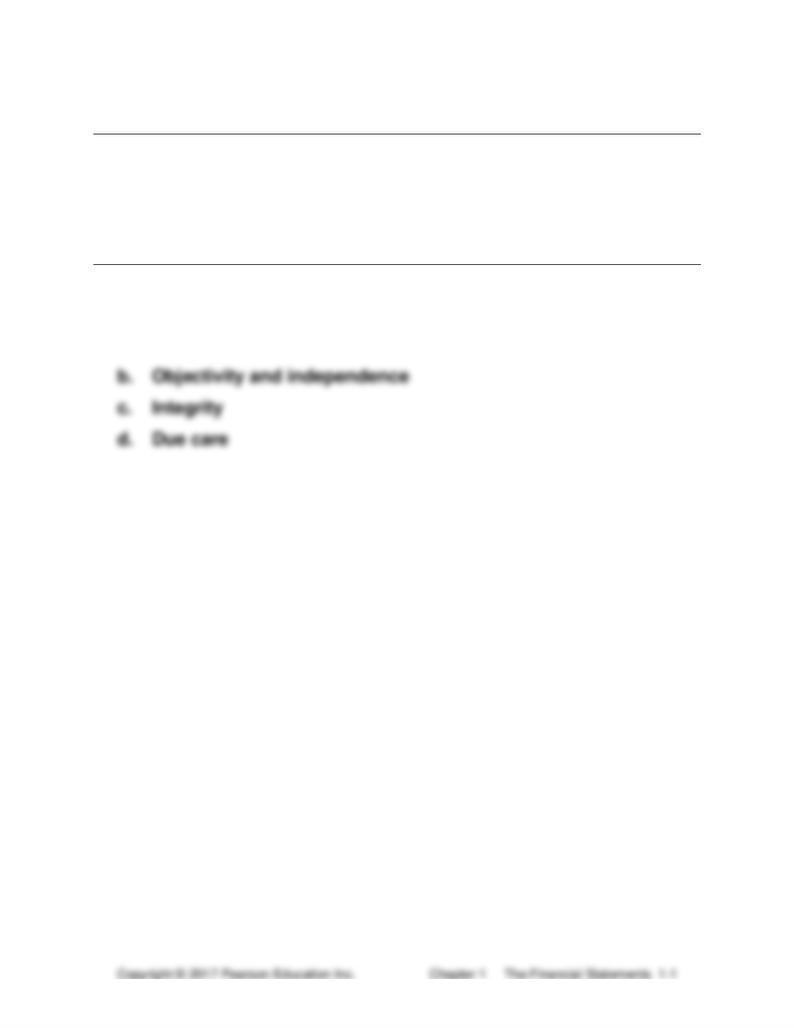
Chapter 1
The Financial Statements
Ethics Check
(5-10 min.) EC 1-1
a. Integrity
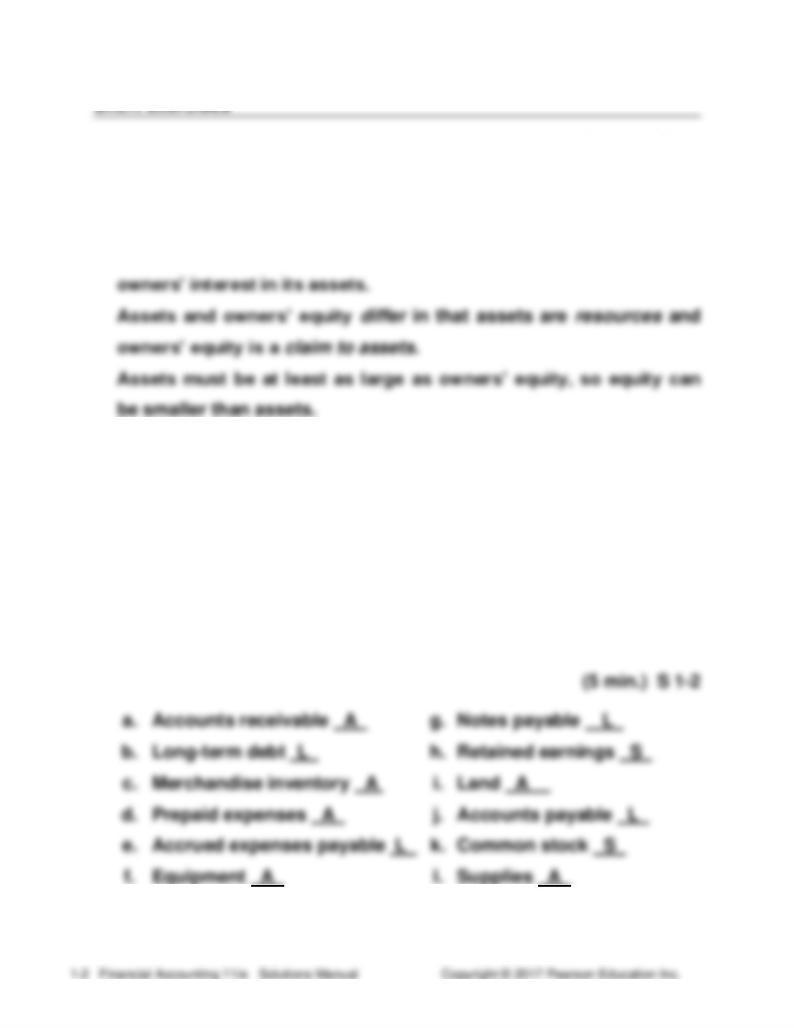
Short Exercises
1. Assets are the economic resources of a business that are expected
to produce a benefit in the future.
Owners’ equity represents the insider claims of a business, the
2. Both liabilities and owners’ equity are claims to assets.
Liabilities are the outsider claims to the assets of a business; they
are obligations to pay creditors.
Owners’ equity represents the insider claims to the assets of the
business; they are the owners’ interest in its assets.
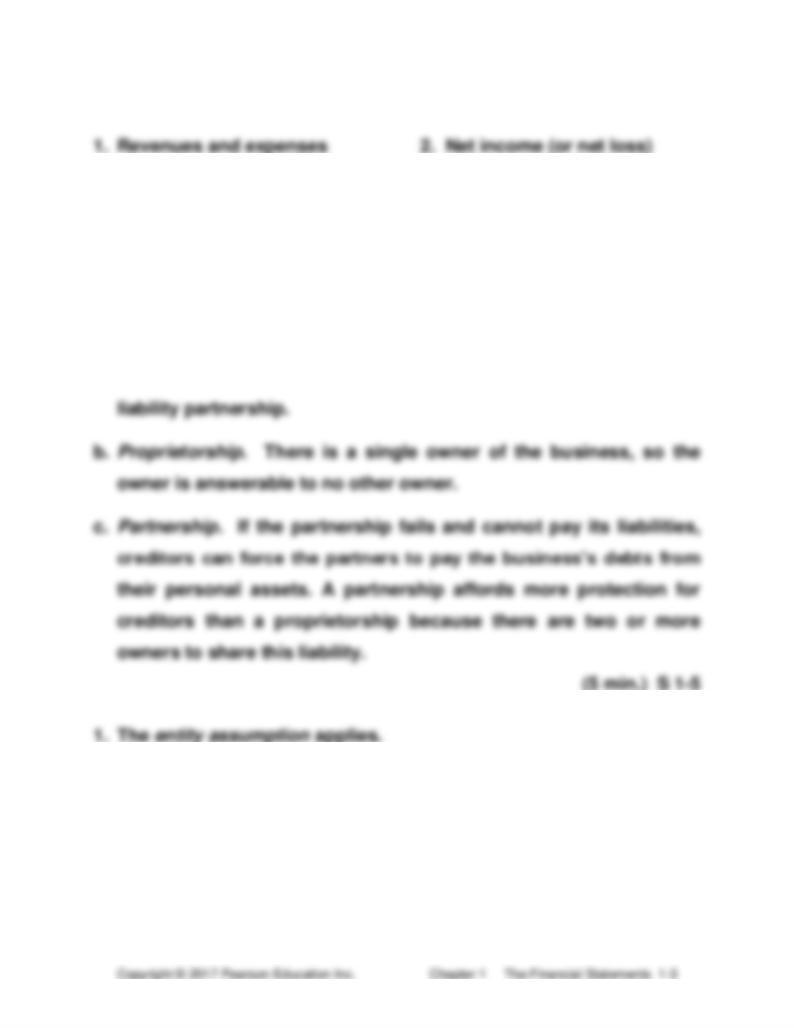
(5 min.) S 1-3
(10 min.) S 1-4
a. Corporation, limited partners of a Limited-liability partnership (LLP)
and Limited-liability company (LLC). If any of these businesses
fails and cannot pay its liabilities, creditors cannot force the
owners to pay the business’s debts from the owners’ personal
assets. Creditors can go after the general partner of a limited
2. Application of the entity assumption will separate Olson’s personal
assets from the assets of Healthy Fast Foods. This will help Olson,
investors, and lenders know how much assets, liabilities and
equity the business has, and this knowledge will help all parties
evaluate the business realistically.
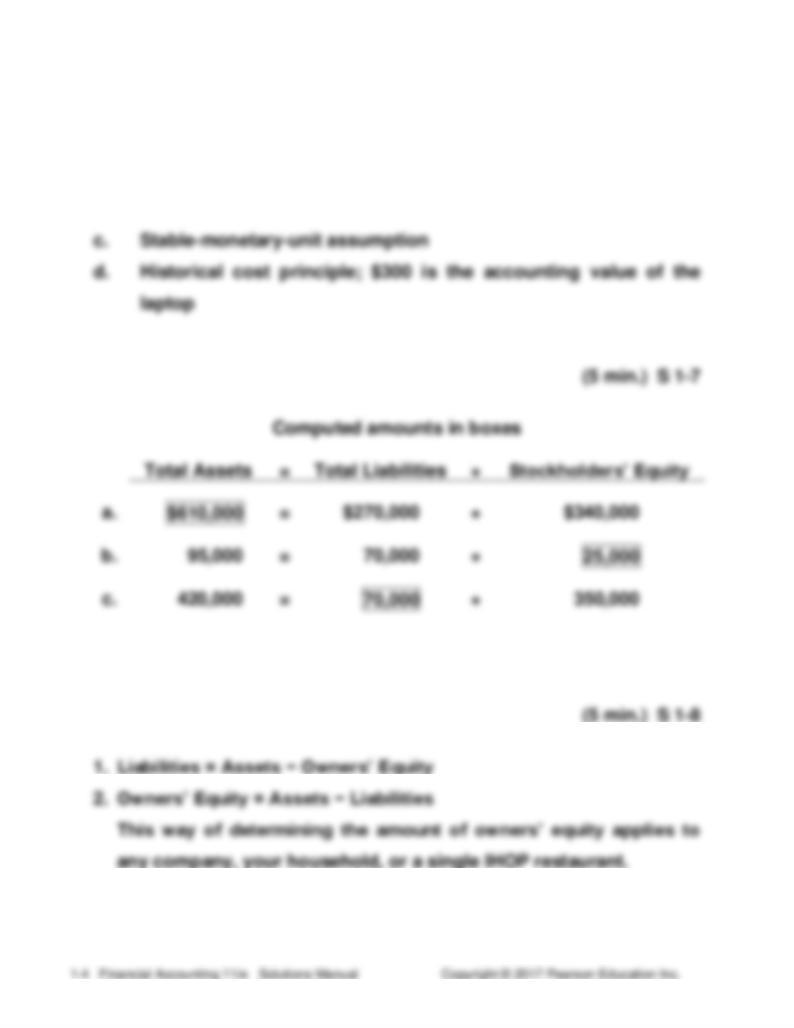
(5-10 min.) S 1-6
a. Historical cost principle; the sale price is the amount actually
received from the sale
b. Entity assumption
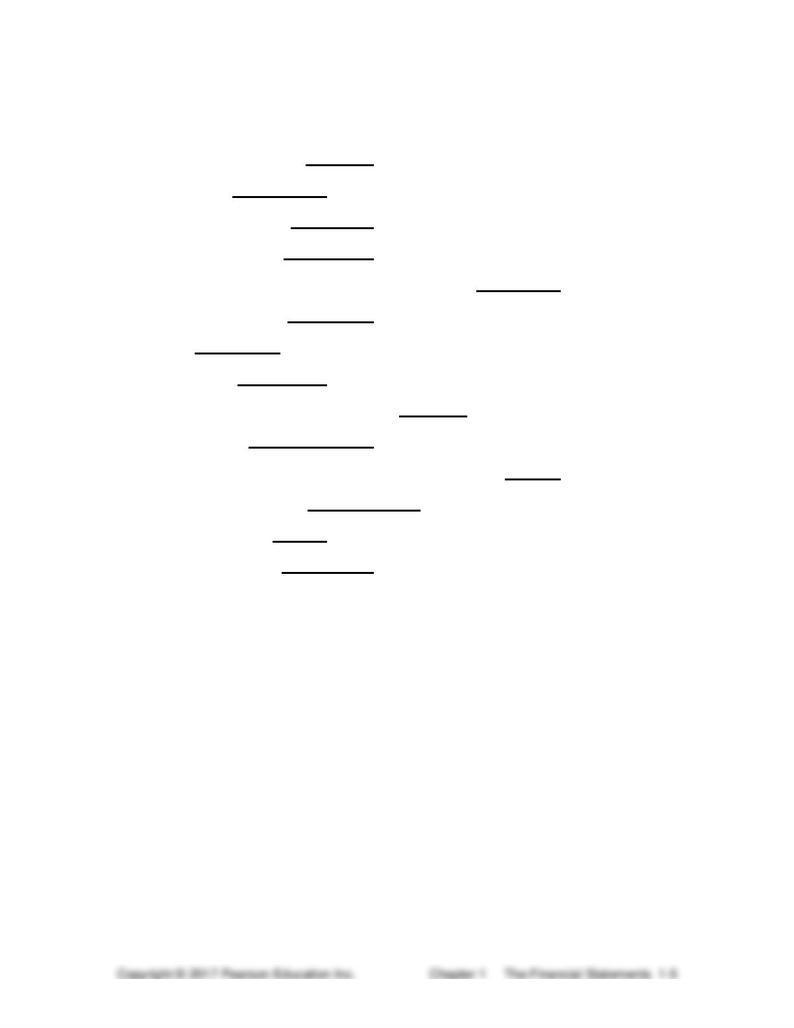
(10 min.) S 1-9
a. Accounts payable B
b. Inventory B
c. Interest revenue I
d. Long-term debt B
e. Net cash used for financing activities C
f. Salary expense I
g. Cash B, C
h. Dividends R, C
i. Increase or decrease in cash C
j. Net income I, R, C
k. Net cash provided by operating activities C
l. Retained earnings R, B
m. Sales revenue I
n. Common stock B
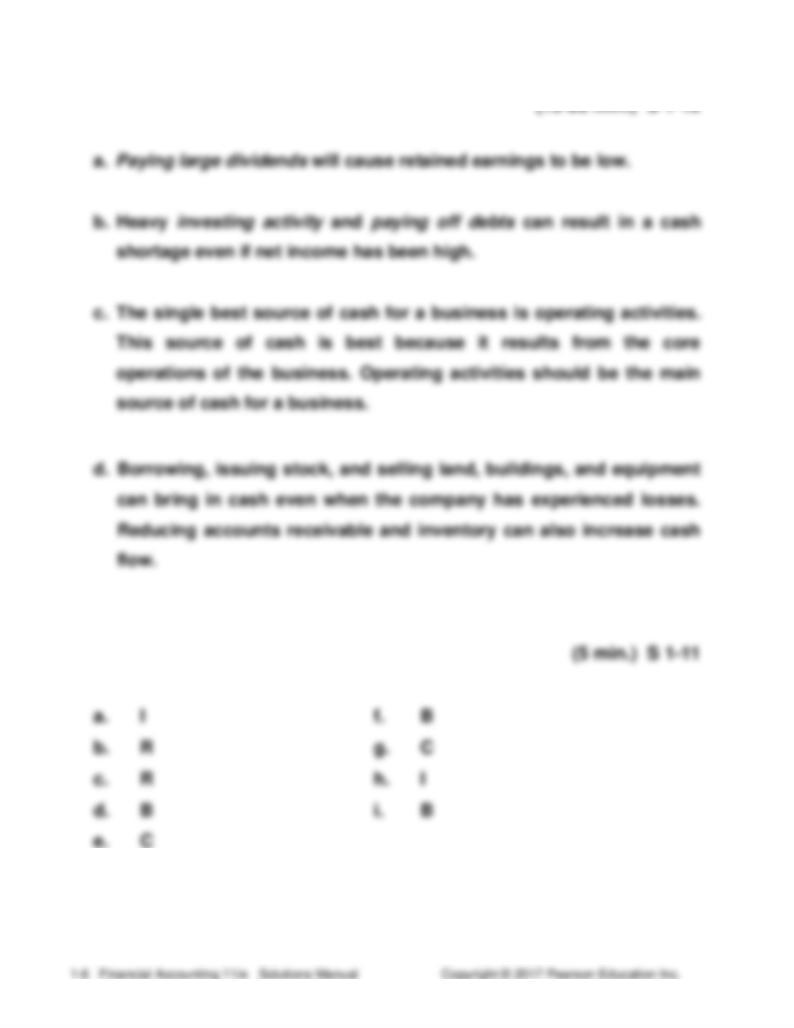
(15-20 min.) S 1-10
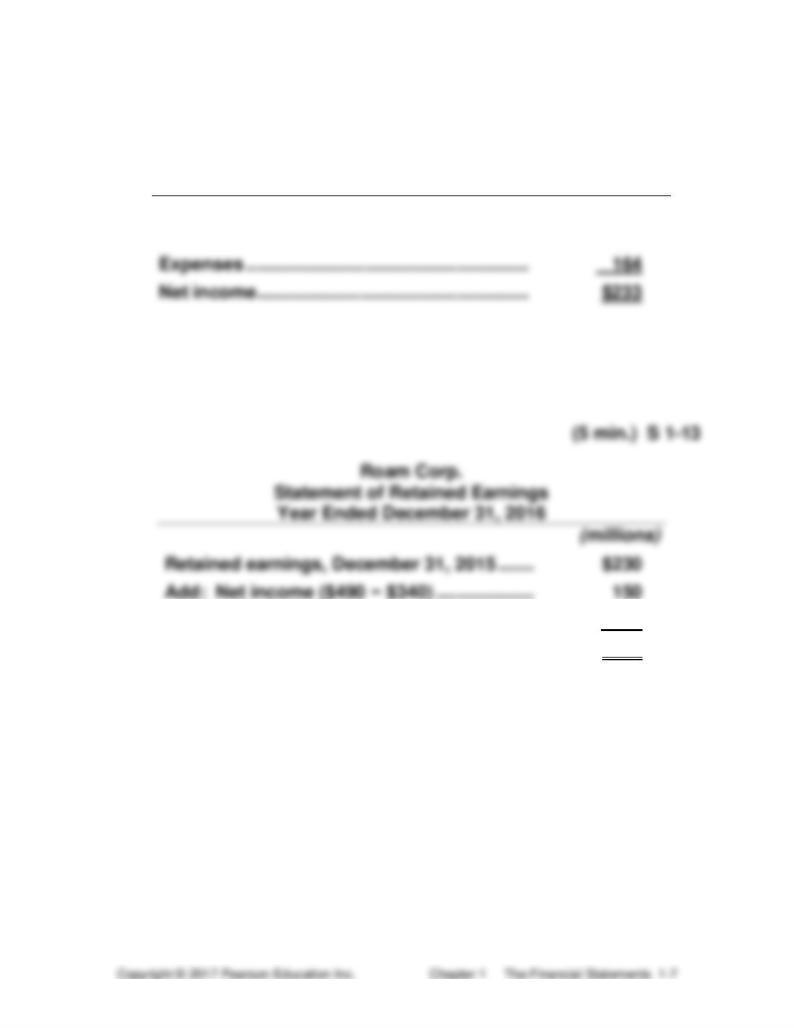
(5 min.) S 1-12
O’Conner Services, Inc.
Income Statement
Year Ended December 31, 2016
(millions)
Revenues .......................................................
$397
Less: Dividends declared .............................
(54)
Retained earnings, December 31, 2016 .......
$326
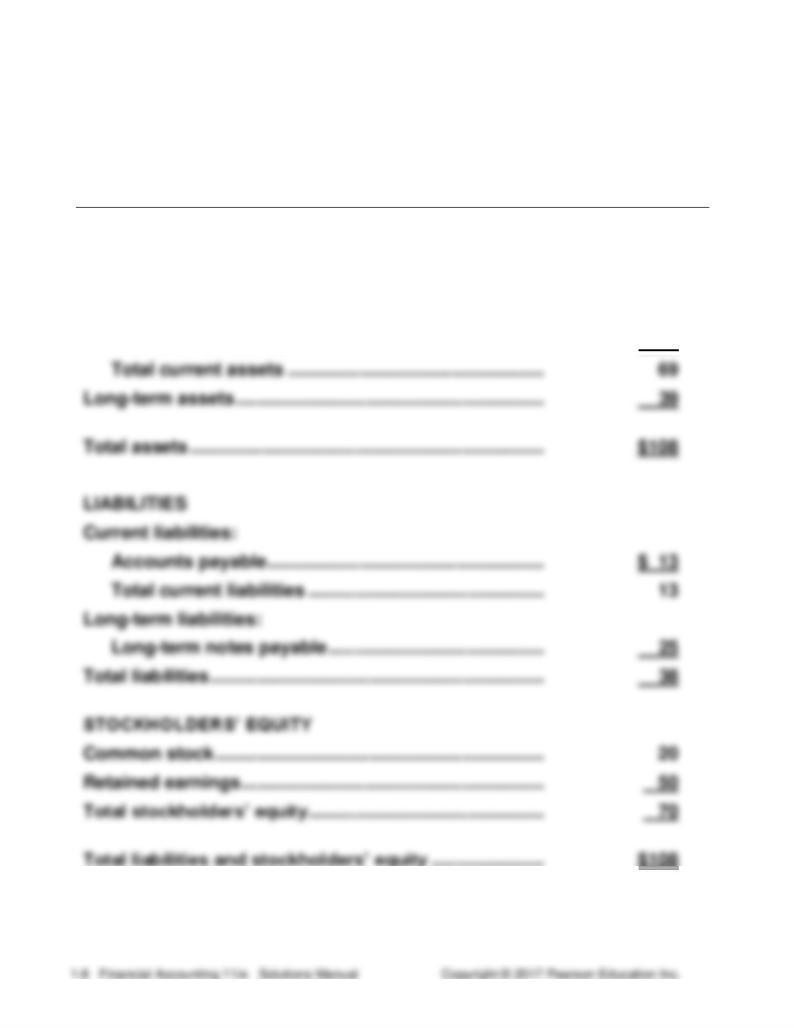
(10-15 min.) S 1-14
Aloha Enterprises
Balance Sheet
December 31, 2016
ASSETS
(in millions)
Current assets:
Cash ...........................................................................
$ 50
Accounts receivable ..................................................
19
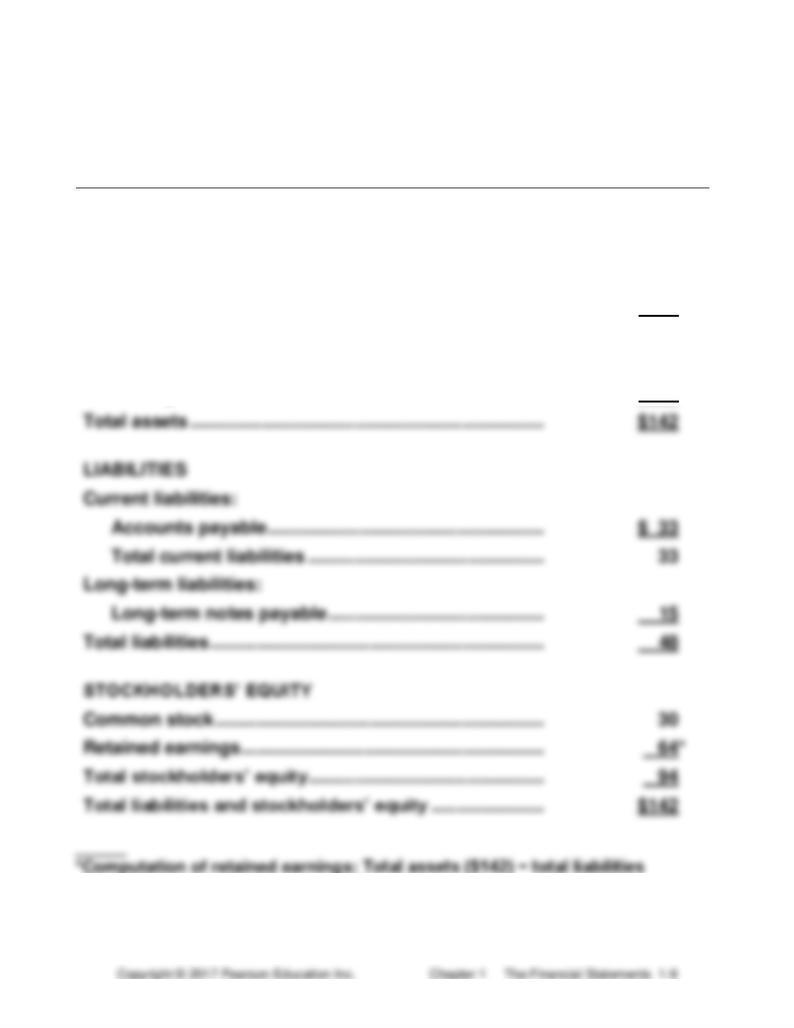
(10-15 min.) S 1-15
Harmon Corporation
Balance Sheet
September 30, 2016
ASSETS
(in millions)
Current assets:
Cash ...........................................................................
$ 75
Accounts receivable ..................................................
22
Total current assets ..................................................
97
Property and equipment .................................................
28
Other long-term assets ...................................................
17
($48) − common stock ($30) = $64
Or, total stockholders’ equity ($94) – common stock ($30) = $64

(10-15 min.) S 1-16
Avalon Legal Services, Inc.
Statement of Cash Flows
Year Ended December 31, 2016
Cash flows from operating activities:
Net income ..................................................................
$105,000

(10-15 min.) S 1-17
Solve in this order:
a. $81
b. $81
c. $143
f. $143
g. $168
h. $208
e. $208
d. $96
(5 min.) S 1-18
Ethics is a factor that should be included in every business and
accounting decision, beyond the potential economic and legal
consequences. Ideally, for each decision, honesty and truthfulness
should prevail, considering the rights of others. The decision
guidelines at the end of the chapter spell out the considerations we
should take when making decisions. Simply, we might ask ourselves
three questions: (1) Is the action legal? (2) Who will be affected by
the decision? (3) How will the decision make me feel afterward?
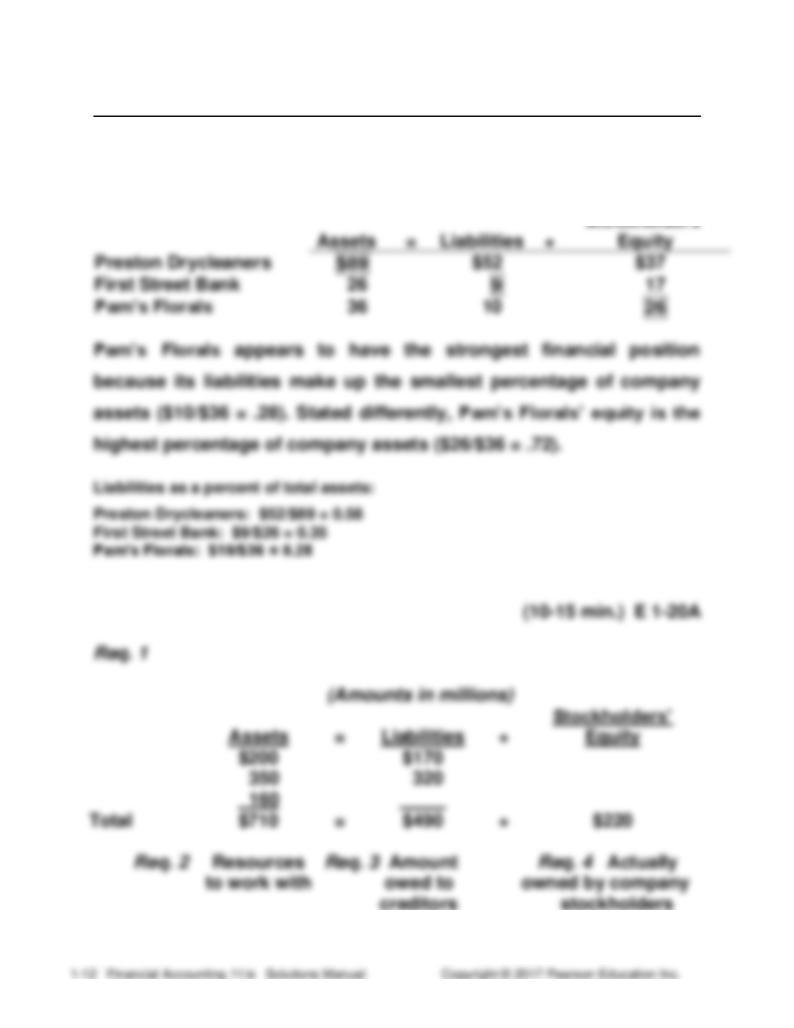
Exercises
(10-15 min.) E 1-19A
Amounts in billions; (computed amounts in boxes)
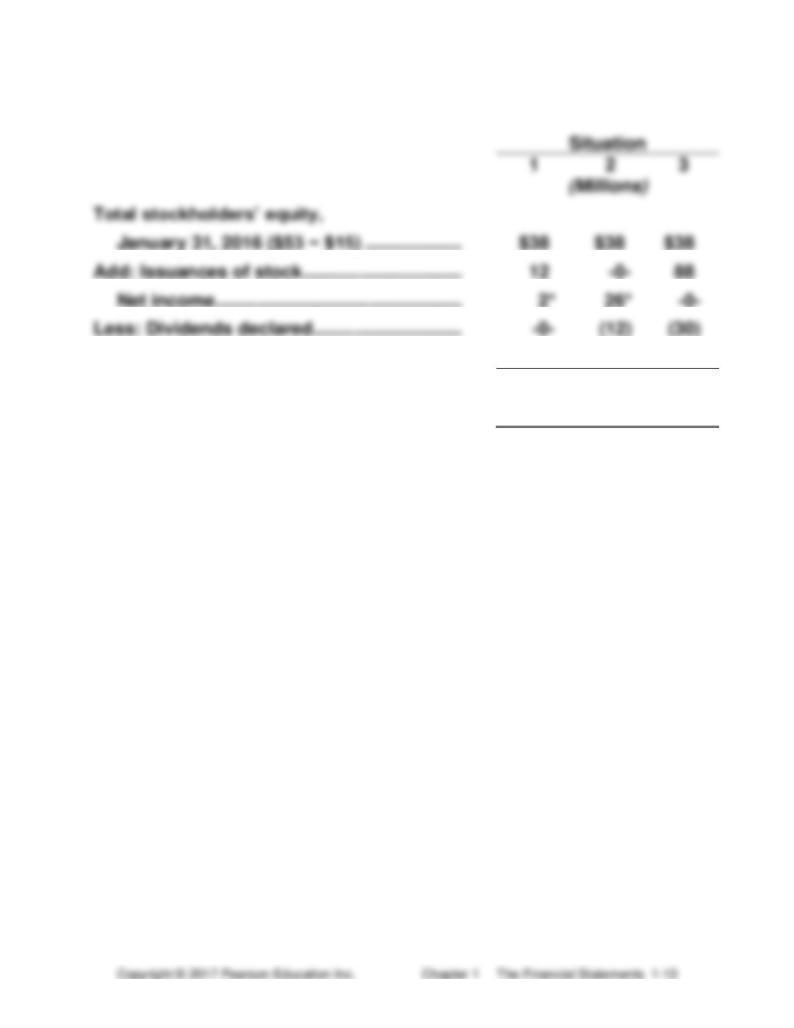
(10-20 min.) E 1-21A
Net loss .....................................................
-0-
-0-
(44)*
Total stockholders’ equity,
January 31, 2017 ($75 − $23) ...................
$52
$52
$52
_____
*Must solve for these amounts.
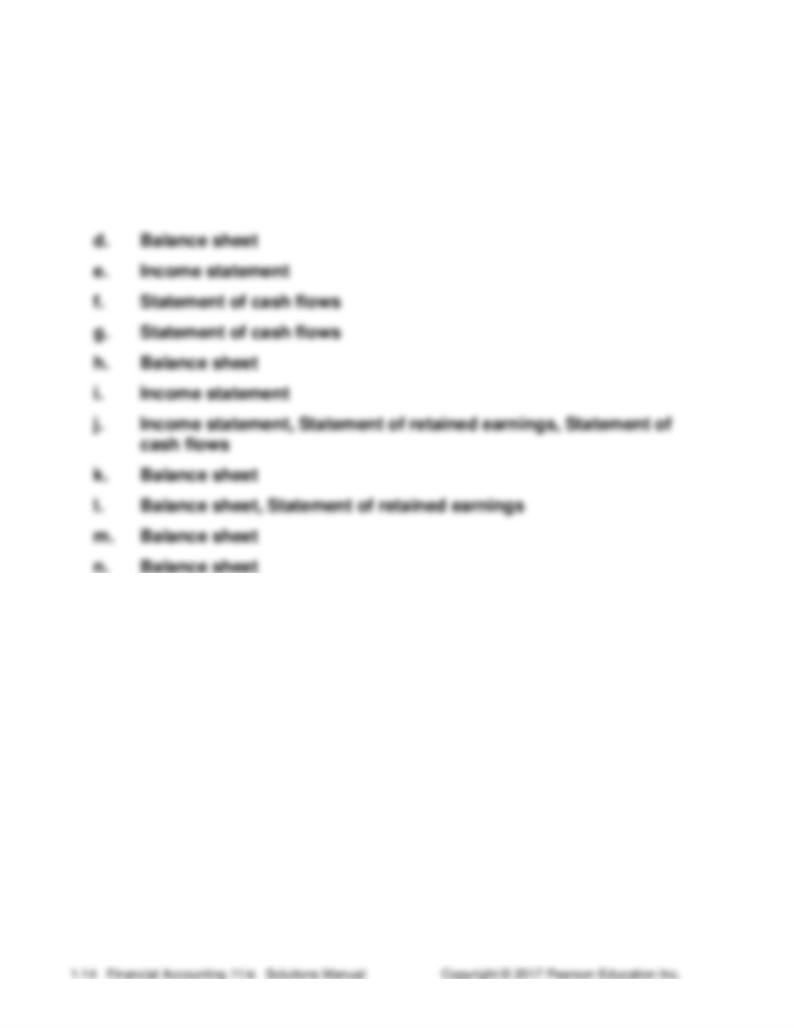
(10-15 min.) E 1-22A
a. Income statement
b. Statement of retained earnings, Statement of cash flows
c. Balance sheet, Statement of cash flows
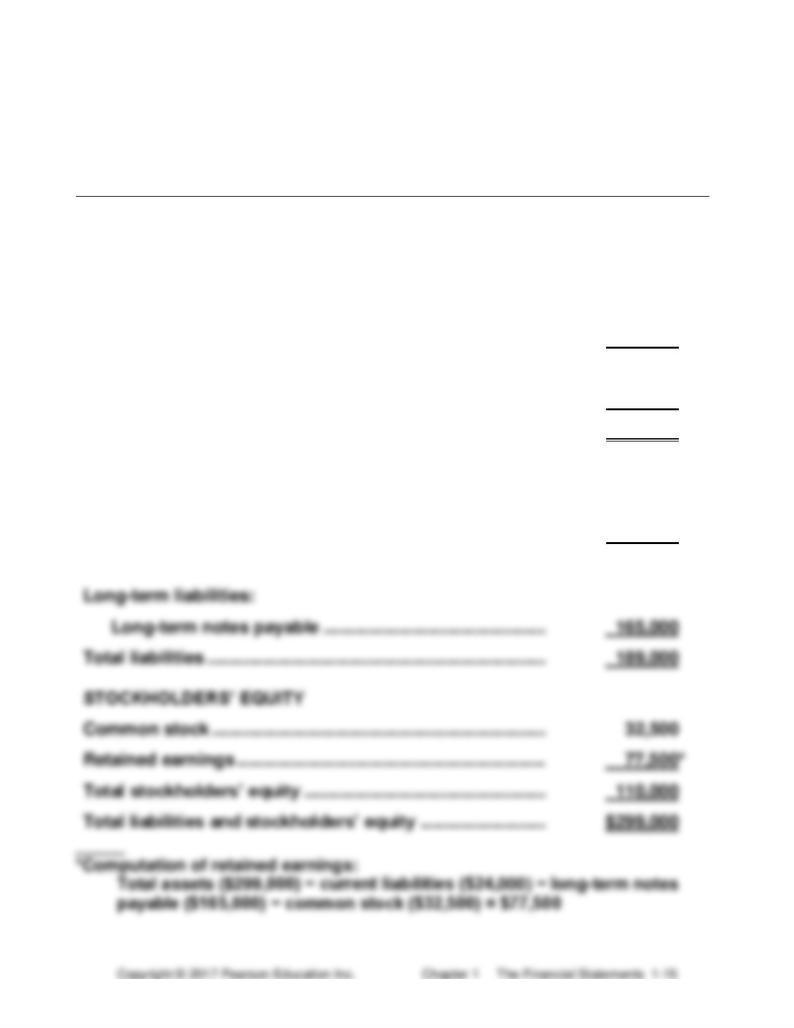
(10-20 min.) E 1-23A
Womack Products
Balance Sheet
December 31, 2016
ASSETS
Current assets:
Cash .................................................................................
$ 23,000
Receivables .....................................................................
15,000
Inventory .........................................................................
77,000
Total current assets .......................................................
115,000
Equipment .............................................................................
184,000
Total assets ..........................................................................
$299,000
LIABILITIES
Current liabilities:
Accounts payable ..........................................................
$ 24,000
Total current liabilities ...................................................
24,000
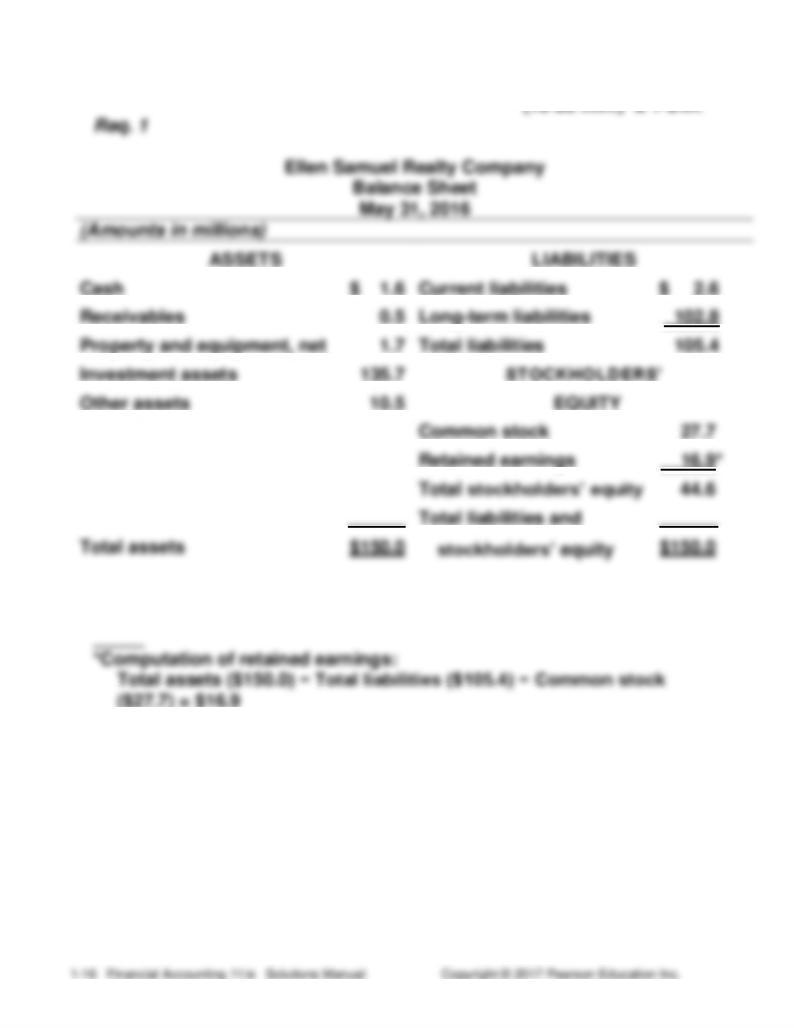
(10-20 min.) E 1-24A
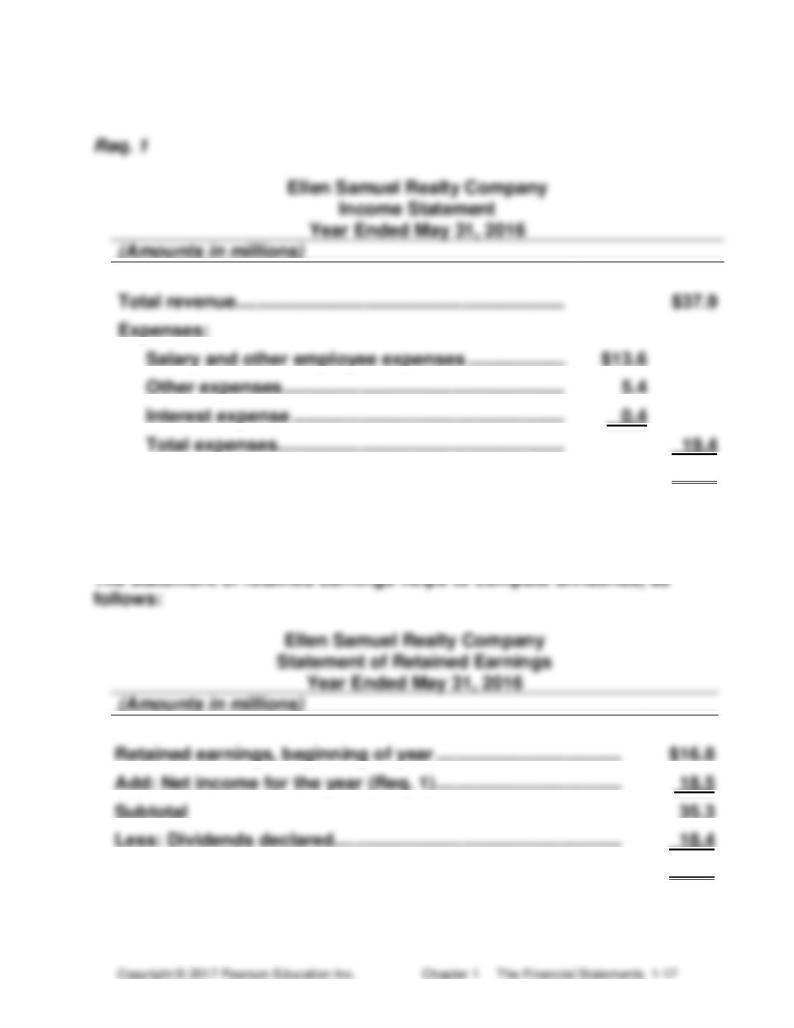
(15-25 min.) E 1-25A
Net income....................................................................
$18.5
Req. 2
Retained earnings, end of year (from Exercise 1-24A) .........
$16.9
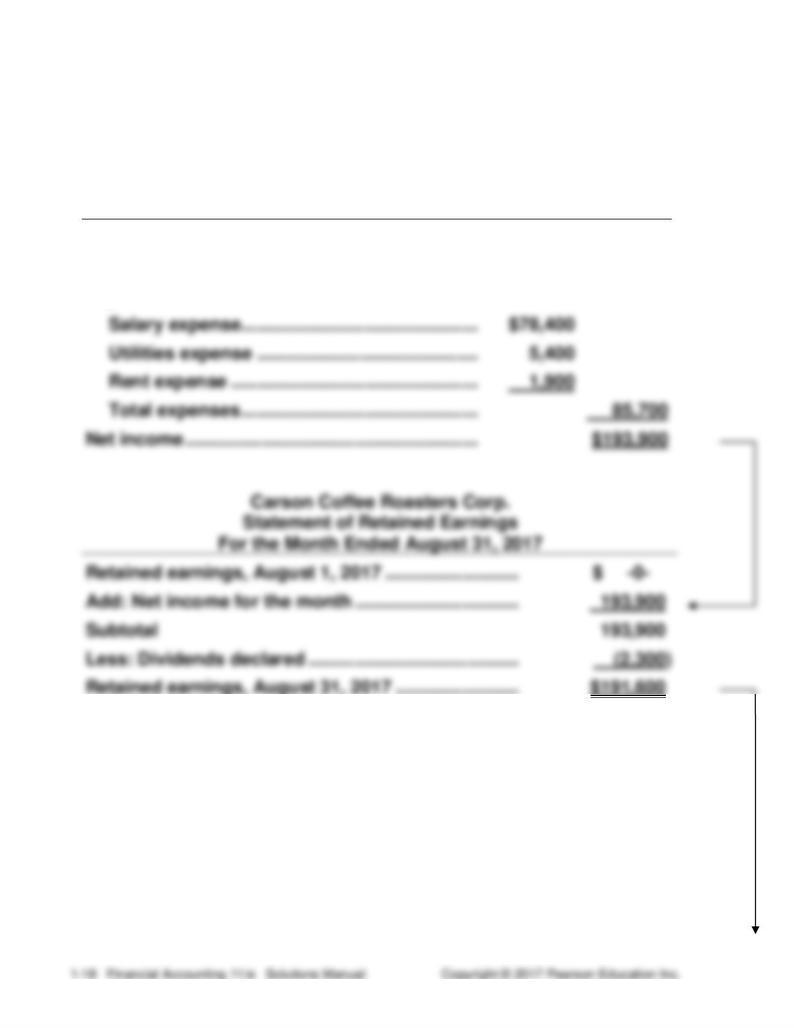
(15-20 min.) E 1-26A
Req. 1
Carson Coffee Roasters Corp.
Income Statement
For the Month Ended August 31, 2017
Revenue:
Service revenue ............................................
$279,600
Expenses:
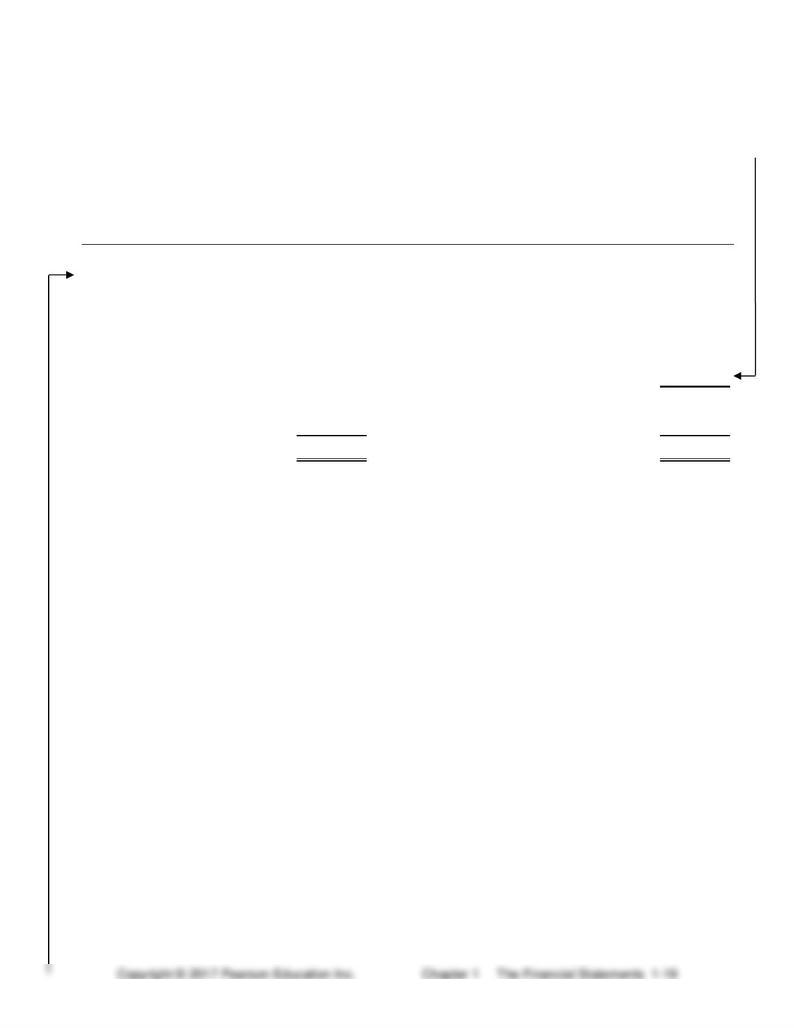
(15-20 min.) E 1-27A
Req. 1
Carson Coffee Roasters Corp.
Balance Sheet
August 31, 2017
Assets
Liabilities
Cash .............................
$ 5,900
Accounts payable .......................
$ 9,000
Office supplies ............
7,500
Equipment ....................
200,400
Stockholders’ Equity
Common stock ...........................
13,200
Retained earnings ......................
191,600
Total stockholders’ equity
204,800
Total liabilities and
Total assets .................
$213,800
stockholders’ equity ...............
$213,800
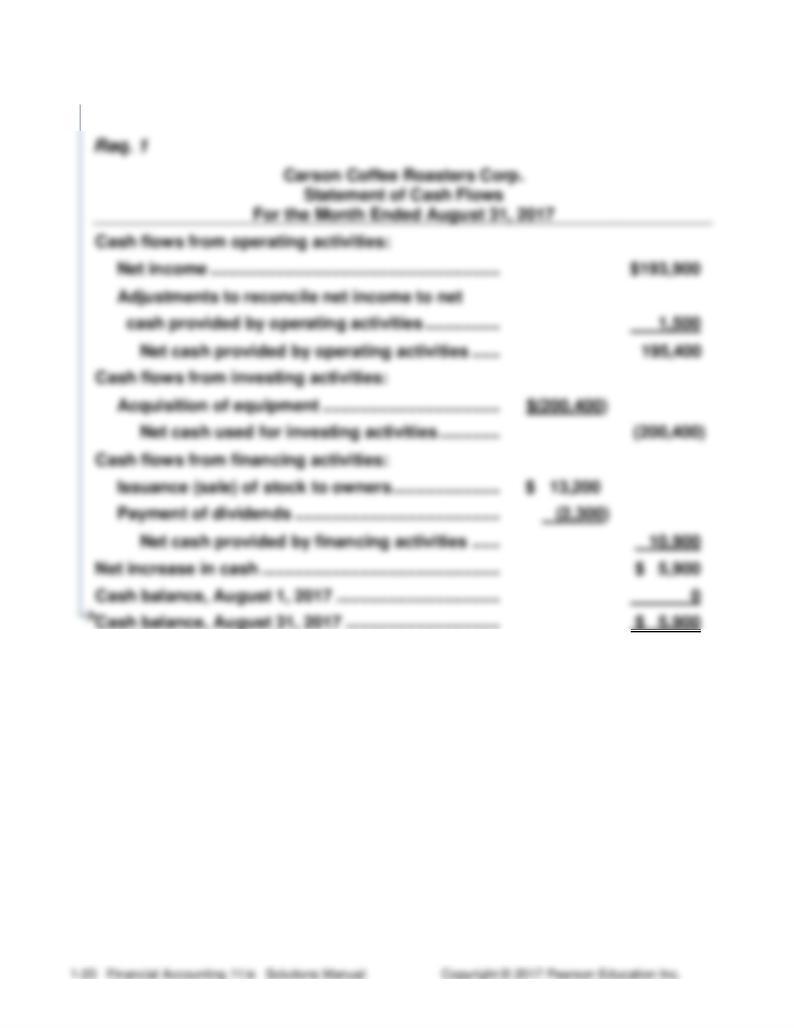
(15-20 min.) E 1-28A
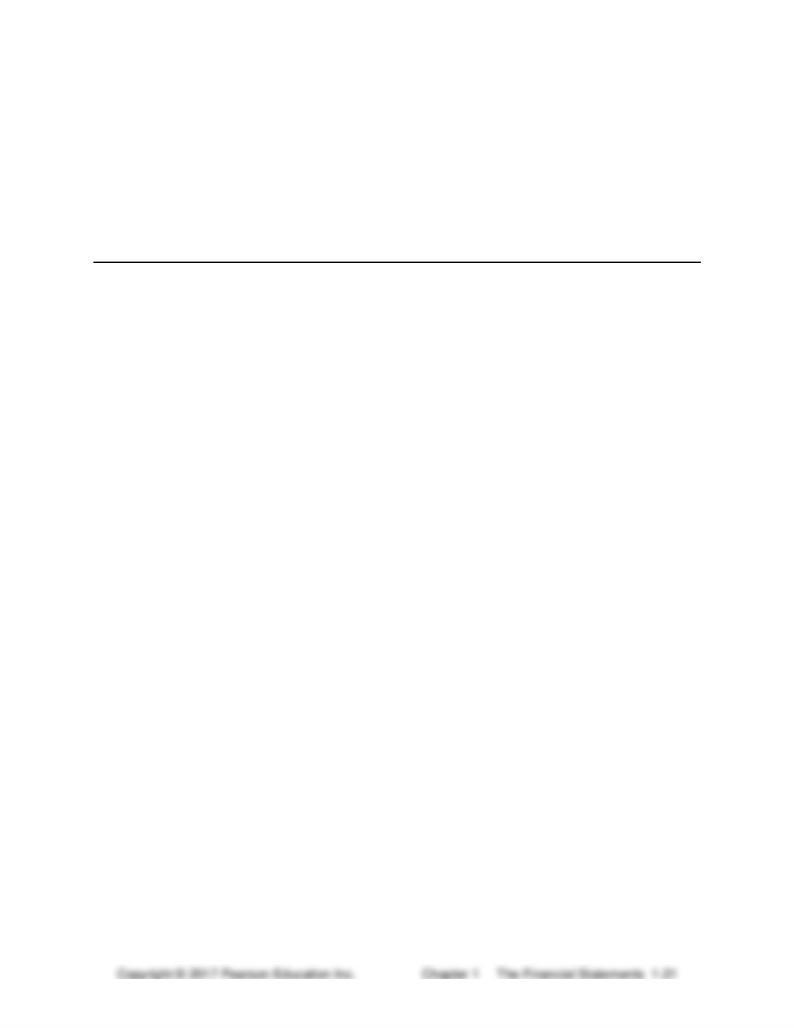
(10-15 min.) E 1-29A
TO: Owner of Carson Coffee Roasters Corp.
FROM: Student Name
SUBJECT: Opinion of net income, dividends, financial position,
and cash flows
Your first month of operations was successful. Revenues totaled
$279,600 and net income was $193,900. These operating results look
very strong.
The company was able to pay a $2,300 dividend, and this should
make you happy with so quick a return on your investment. Your
financial position looks secure, with assets of $213,800 and liabilities
of only $9,000. Your stockholders’ equity is $204,800.
Operating activities generated cash of $195,400, which is
respectable. Operating activities are the main source of cash, which is
expected for a thriving company. You ended the month with cash of
$5,900. Based on the above facts, I believe you should stay in
business.
Student responses may vary.
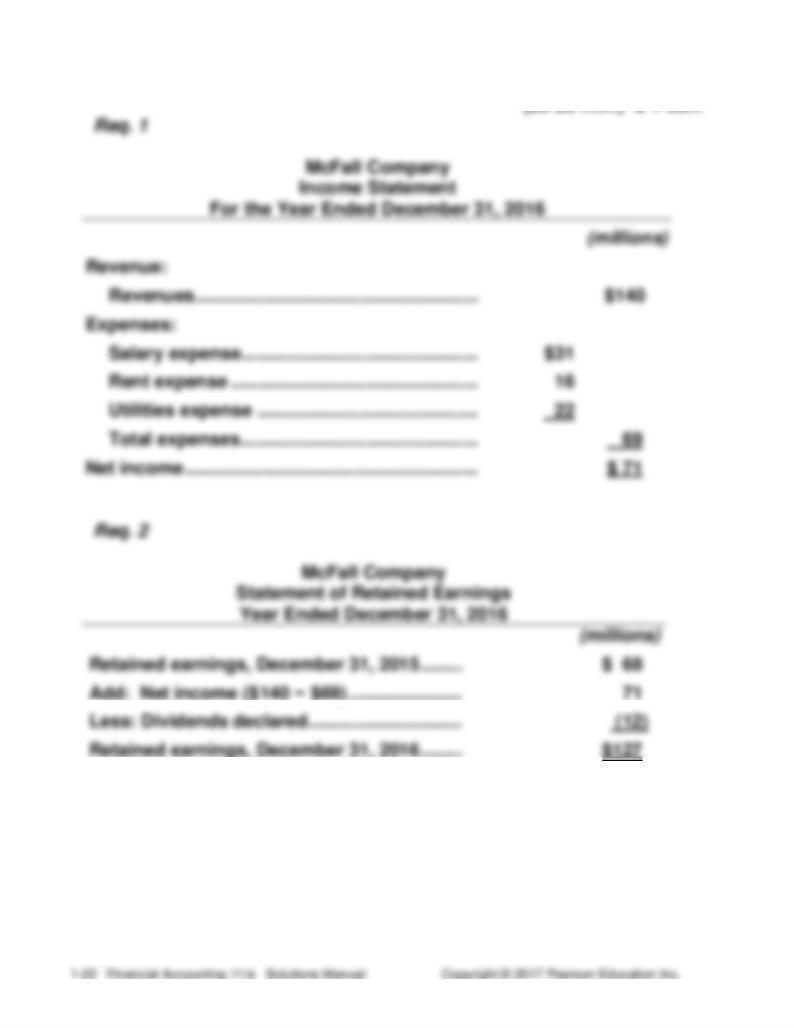
(20-25 min.) E 1-30A
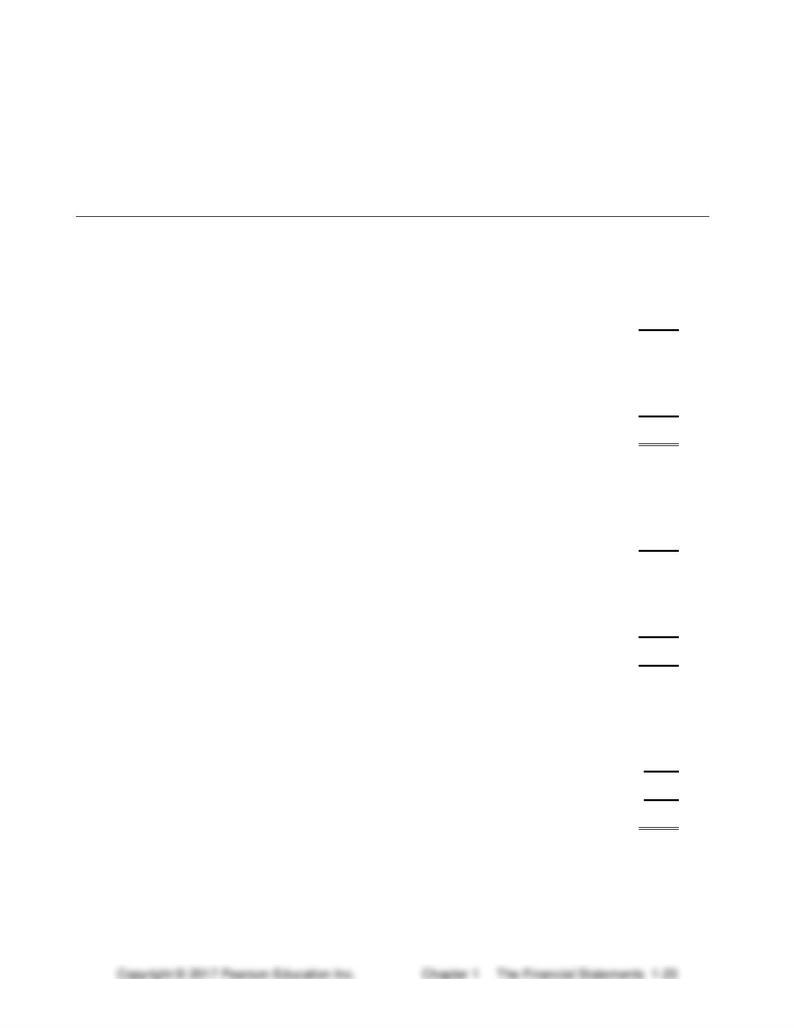
(continued) E 1-30A
Req. 3
McFall Company
Balance Sheet
December 31, 2016
ASSETS
(in millions)
Current assets:
Cash ...........................................................................
$150
Accounts receivable ..................................................
55
Total current assets ..................................................
205
Property and equipment .................................................
32
Other long-term assets ...................................................
17
Total assets .....................................................................
$254
LIABILITIES
Current liabilities:
Accounts payable ......................................................
$ 60
Total current liabilities ..............................................
60
Long-term liabilities:
Long-term notes payable ..........................................
27
Total liabilities .................................................................
87
STOCKHOLDERS’ EQUITY
Common stock ................................................................
40*
Retained earnings ...........................................................
127
Total stockholders’ equity ..............................................
167
Total liabilities and stockholders’ equity ......................
$254
*Common stock = Total stockholders’ equity ($167) – Retained earnings ($127) = $40
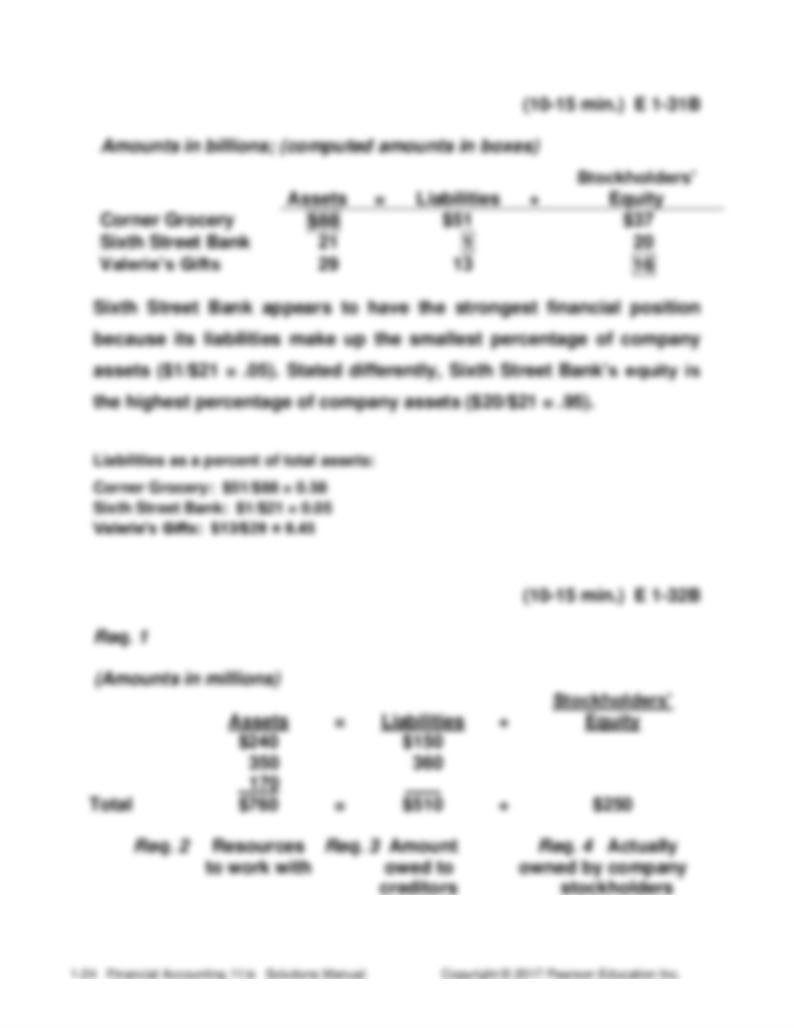
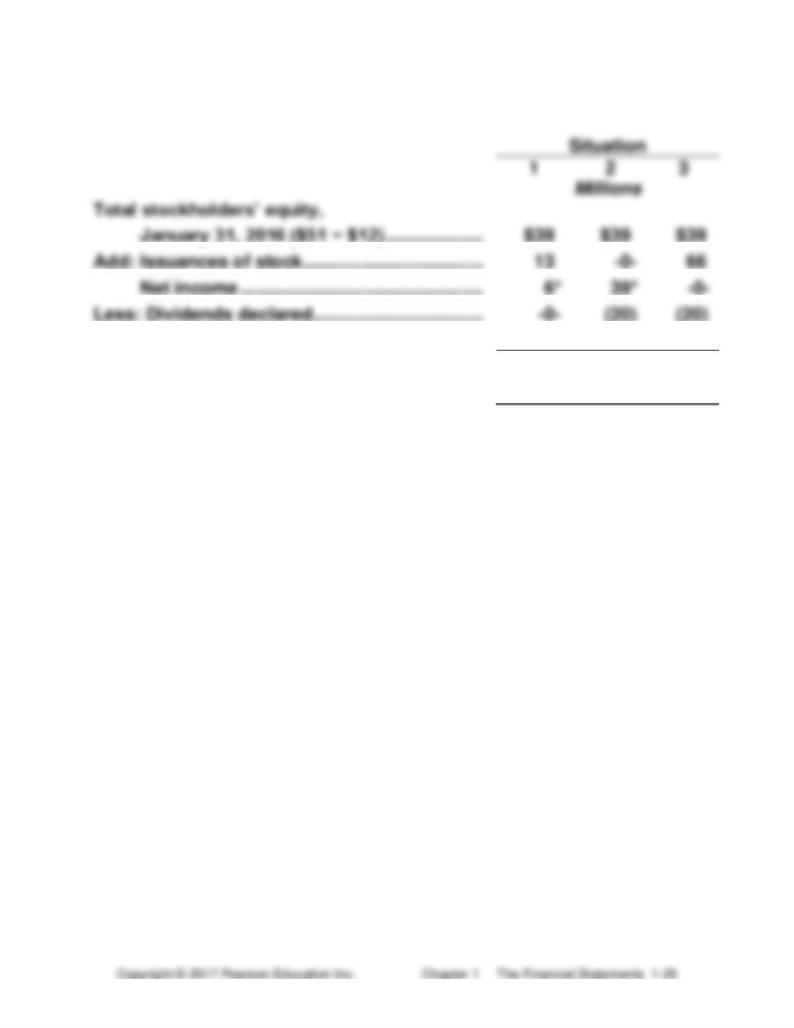
(10-20 min.) E 1-33B
Net loss ....................................................
-0-
-0-
(27)*
Total stockholders’ equity,
January 31, 2017 ($77 − $19) ...................
$58
$58
$58
_____
*Must solve for these amounts.
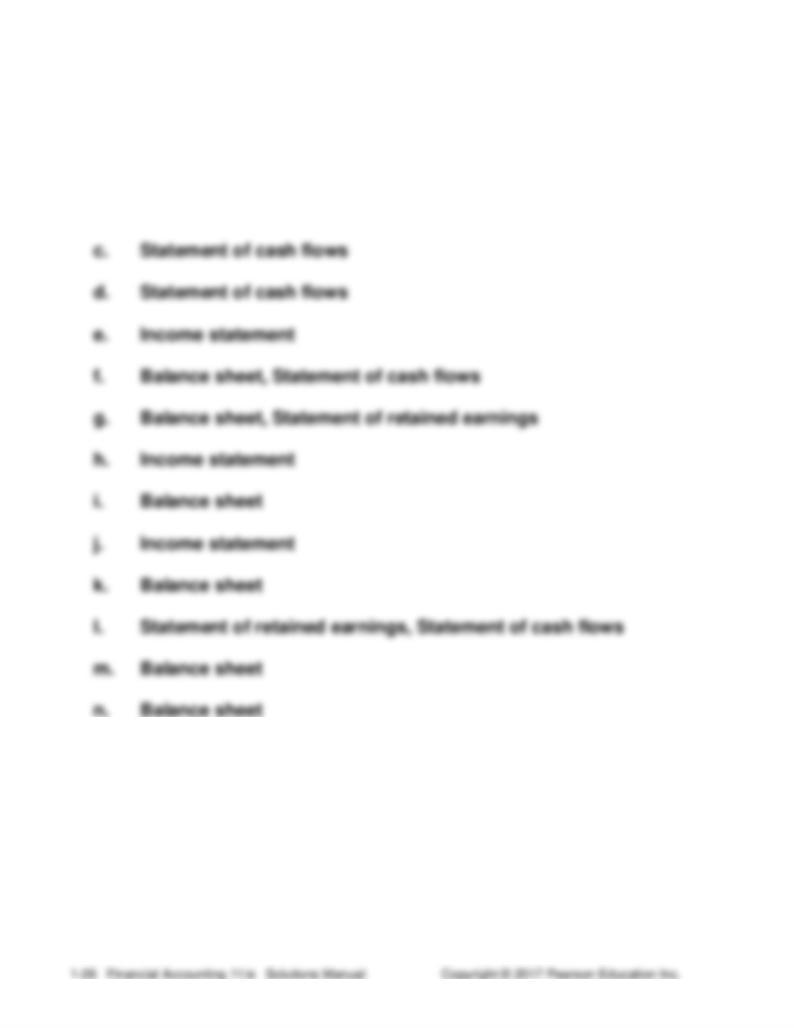
(10-15 min.) E 1-34B
a. Income statement, Statement of retained earnings, Statement of
cash flows
b. Balance sheet
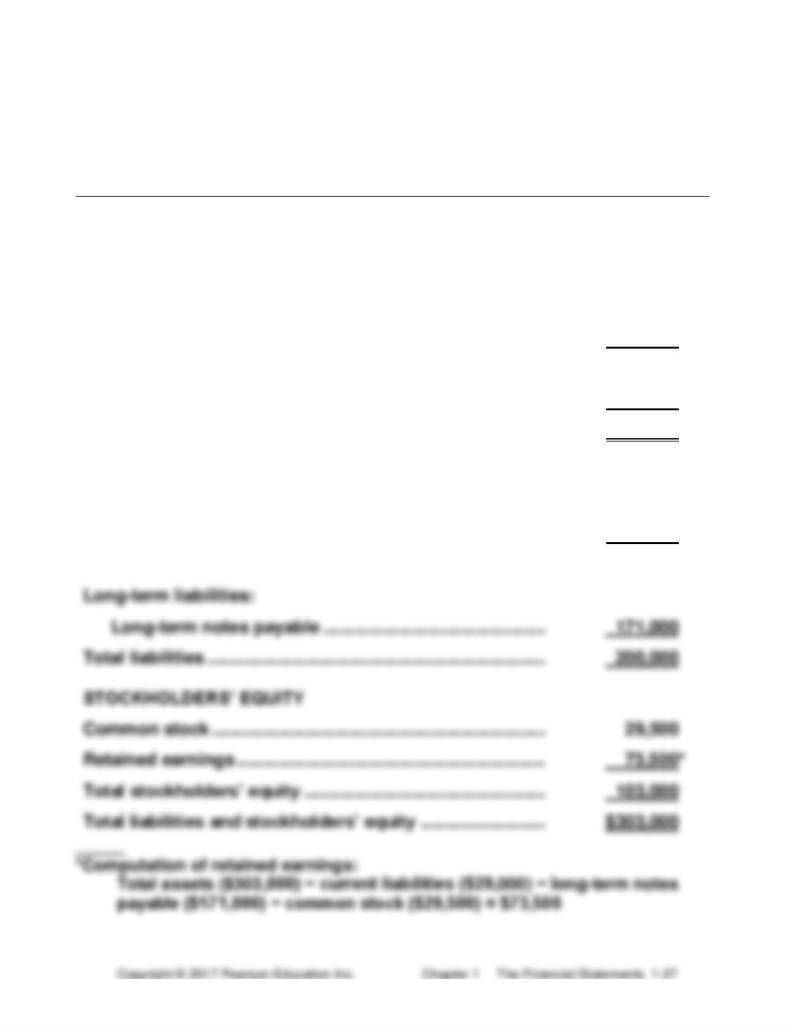
(10-20 min.) E 1-35B
Robinson Products
Balance Sheet
December 31, 2016
ASSETS
Current assets:
Cash .................................................................................
$ 18,000
Receivables .....................................................................
20,000
Inventory .........................................................................
82,000
Total current assets .......................................................
120,000
Equipment .............................................................................
183,000
Total assets ..........................................................................
$303,000
LIABILITIES
Current liabilities:
Accounts payable ..........................................................
$ 29,000
Total current liabilities ...................................................
29,000
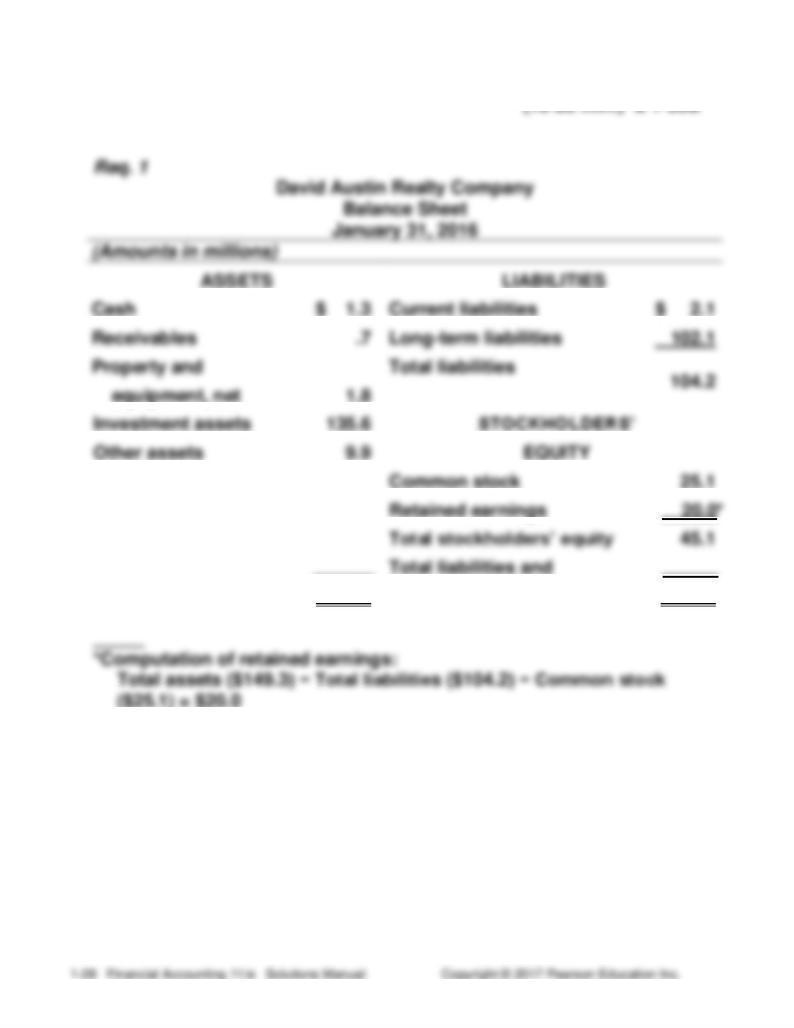
(10-20 min.) E 1-36B
Total assets
$149.3
stockholders’ equity
$149.3
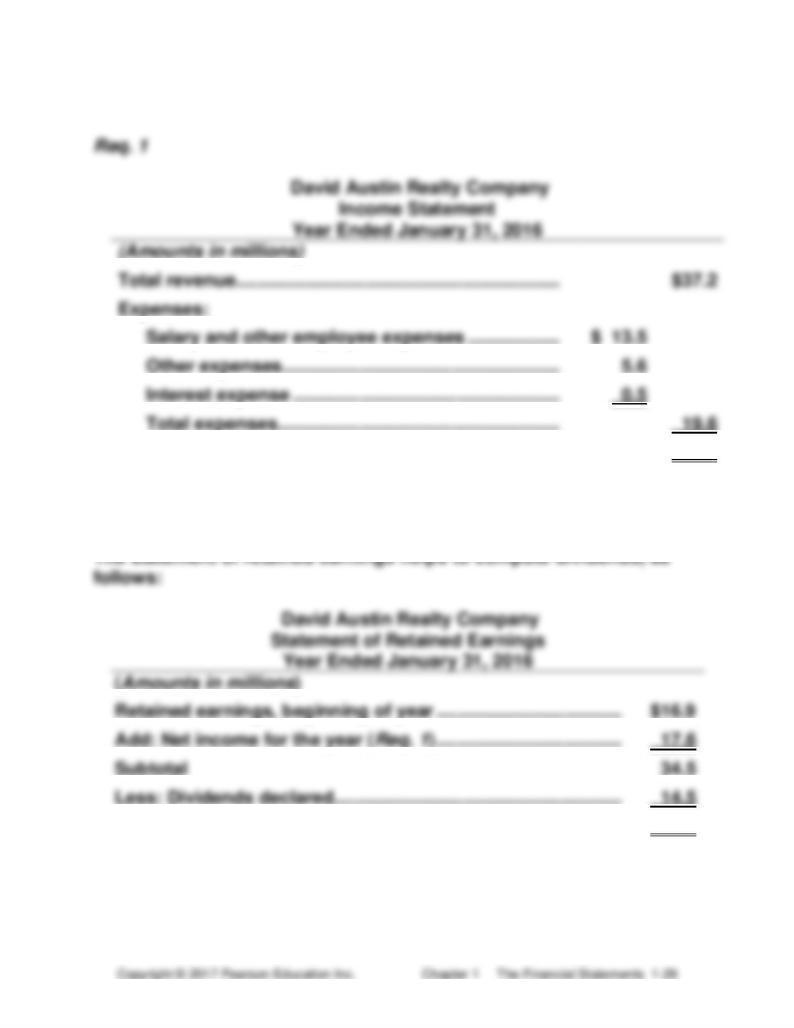
(15-25 min.) E 1-37B
Net income...................................................................
$17.6
Req. 2
Retained earnings, end of year (from Exercise 1-36B) ..........
$20.0
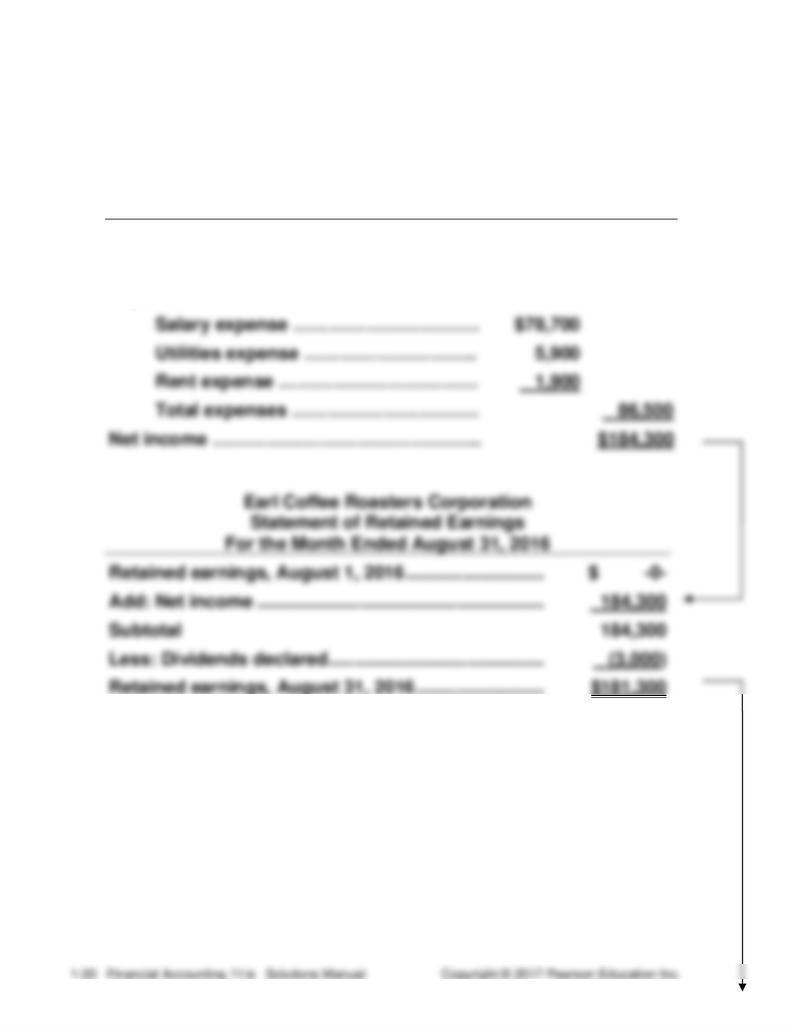
(15-20 min.) E 1-38B
Req. 1
Earl Coffee Roasters Corporation
Income Statement
For the Month Ended August 31, 2016
Revenue:
Service revenue ………………………...
$270,800
Expenses:
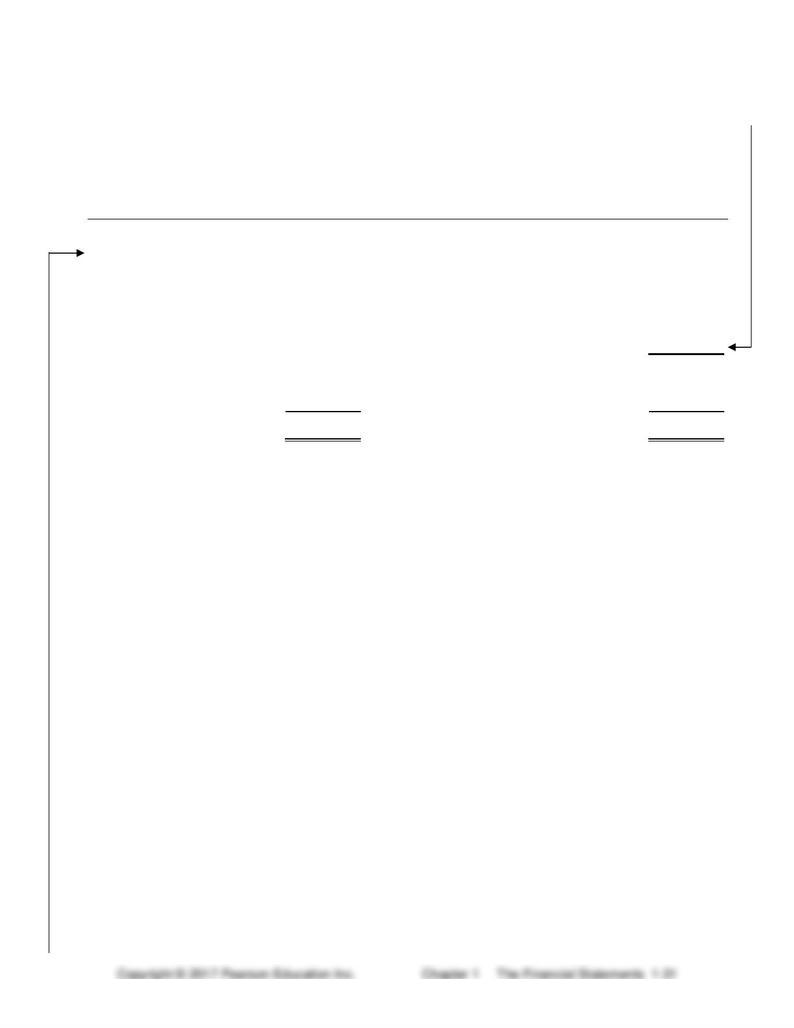
(15-20 min.) E 1-39B
Req. 1
Earl Coffee Roasters Corporation
Balance Sheet
August 31, 2016
Assets
Liabilities
Cash .......................
$ 5,300
Accounts payable..................
$ 8,800
Office supplies ......
7,300
Stockholders’ Equity
Equipment .............
202,100
Common stock ......................
24,600
Retained earnings .................
181,300
Total stockholders’ equity ....
205,900
Total assets ...........
$214,700
Total liabilities and
stockholders’ equity .........
$214,700
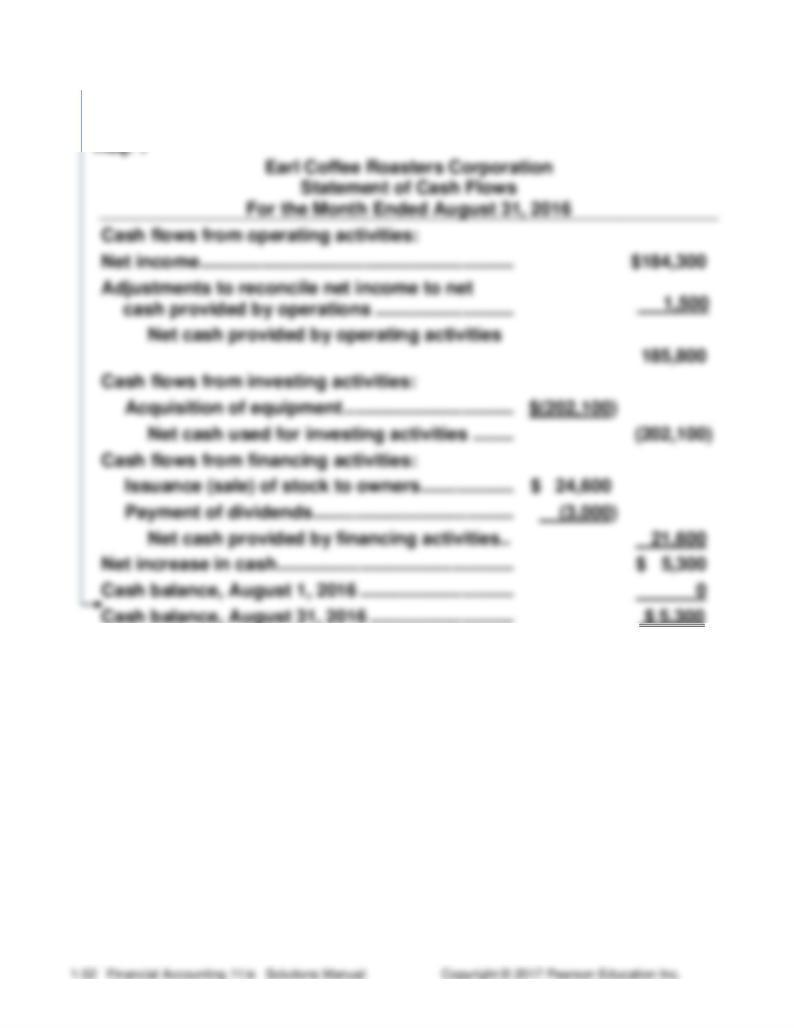
(15-20 min.) E 1-40B
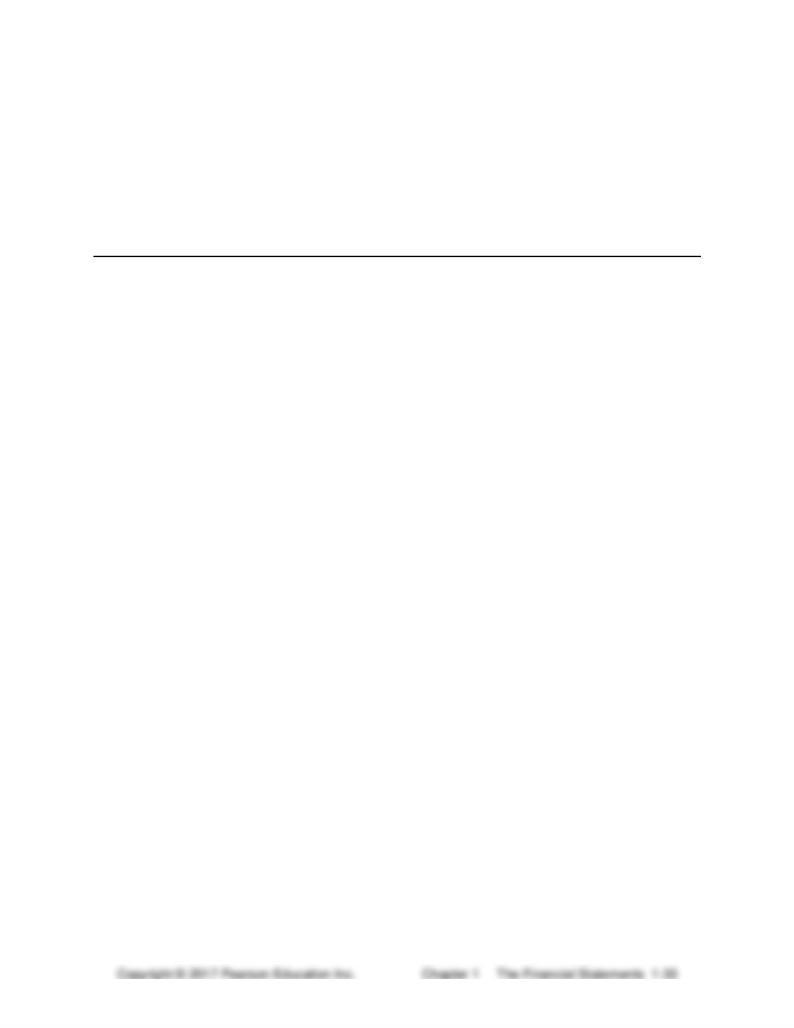
(10-20 min.) E 1-41B
TO: Owner of Earl Coffee Roasters Corporation
FROM: Student Name
SUBJECT: Opinion of net income, dividends, financial position, and
cash flows
Your first month of operations was successful. Revenues totaled
$270,800 and net income was $184,300. These operating results look
very strong.
The company was able to pay a $3,000 dividend, and this should
make you happy with so quick a return on your investment. Your
financial position looks secure, with assets of $214,700 and liabilities
of only $8,800. Your stockholders’ equity is $205,900.
Operating activities generated cash of $185,800, which is
respectable. Operating activities are the main source of cash, which is
expected for a thriving company. You ended the month with cash of
$5,300. Based on the above facts, I believe you should stay in
business.
Student responses may vary.
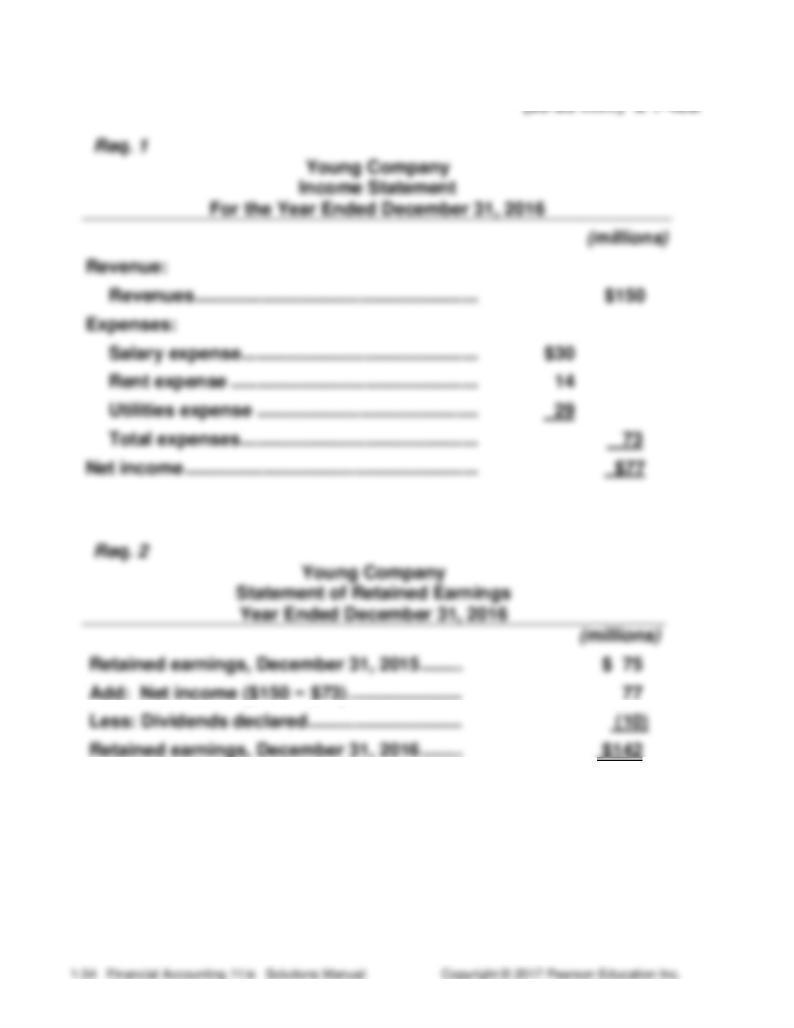
(20-25 min.) E 1-42B
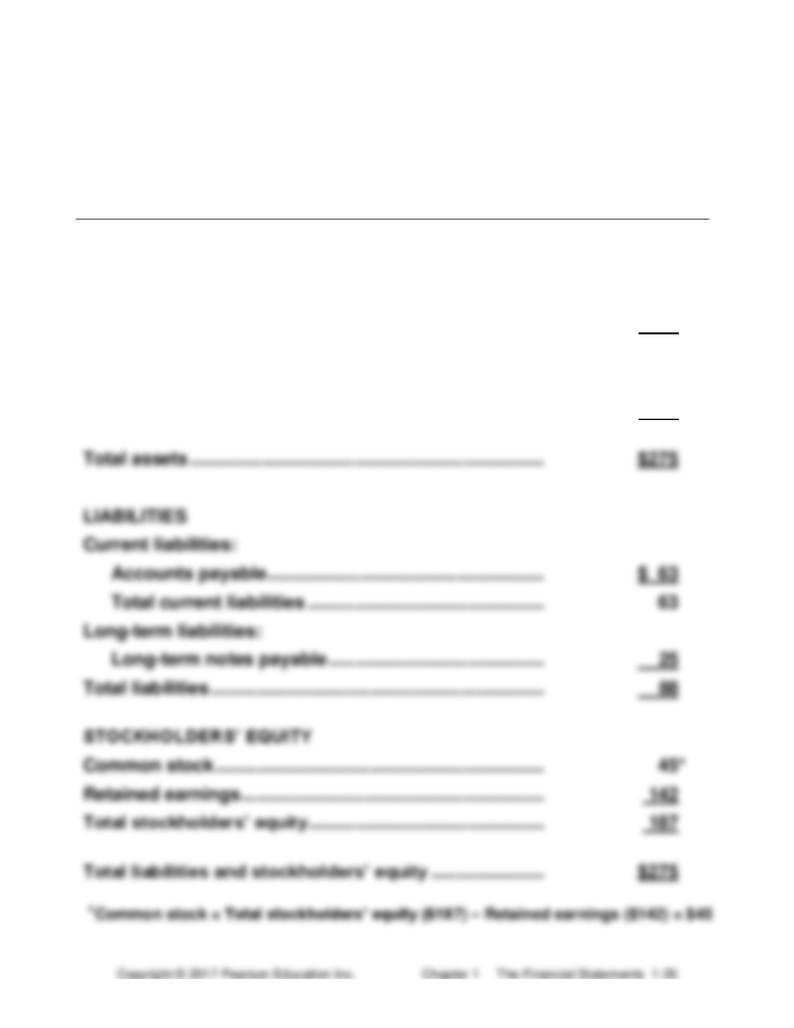
(continued) E 1-42B
Req. 3
Young Company
Balance Sheet
December 31, 2016
ASSETS
(in millions)
Current assets:
Cash ...........................................................................
$160
Accounts receivable ..................................................
62
Total current assets ..................................................
222
Property and equipment .................................................
34
Other long-term assets ...................................................
19
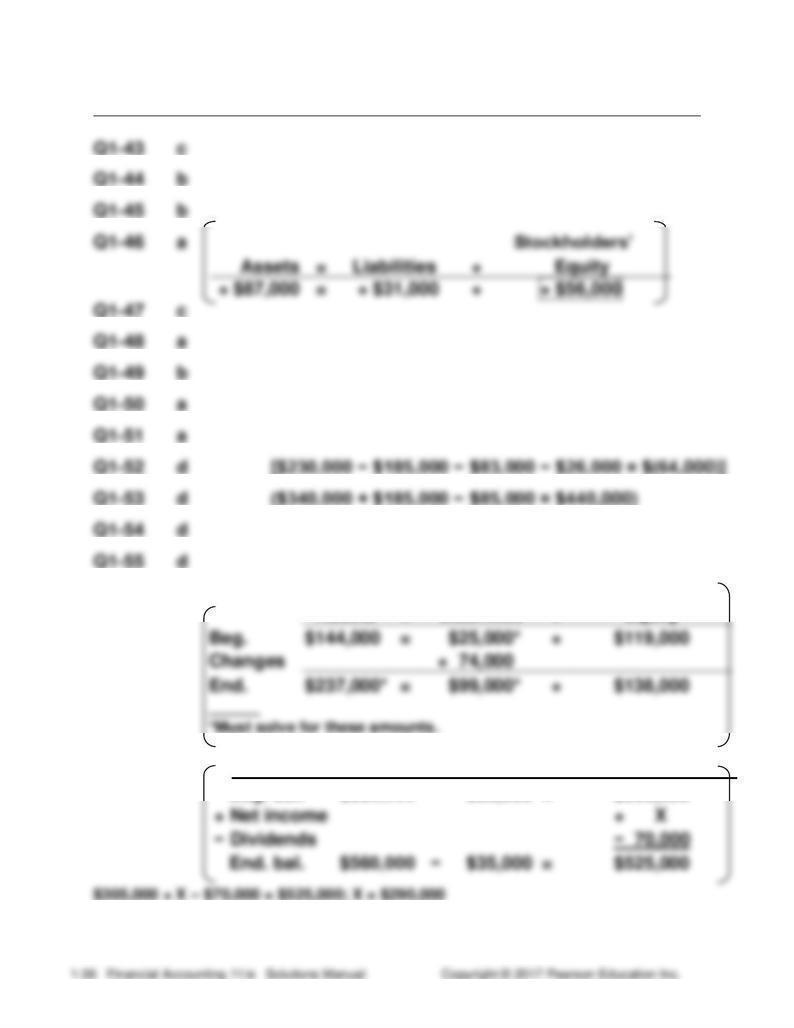
Quiz
Q1-56
c
Stockholders’
Assets
=
Liabilities
+
Equity
Q1-57
c
Assets − Liabilities = Stockholders’ equity
Beg. bal.
$330,000 − $25,000 =
$305,000
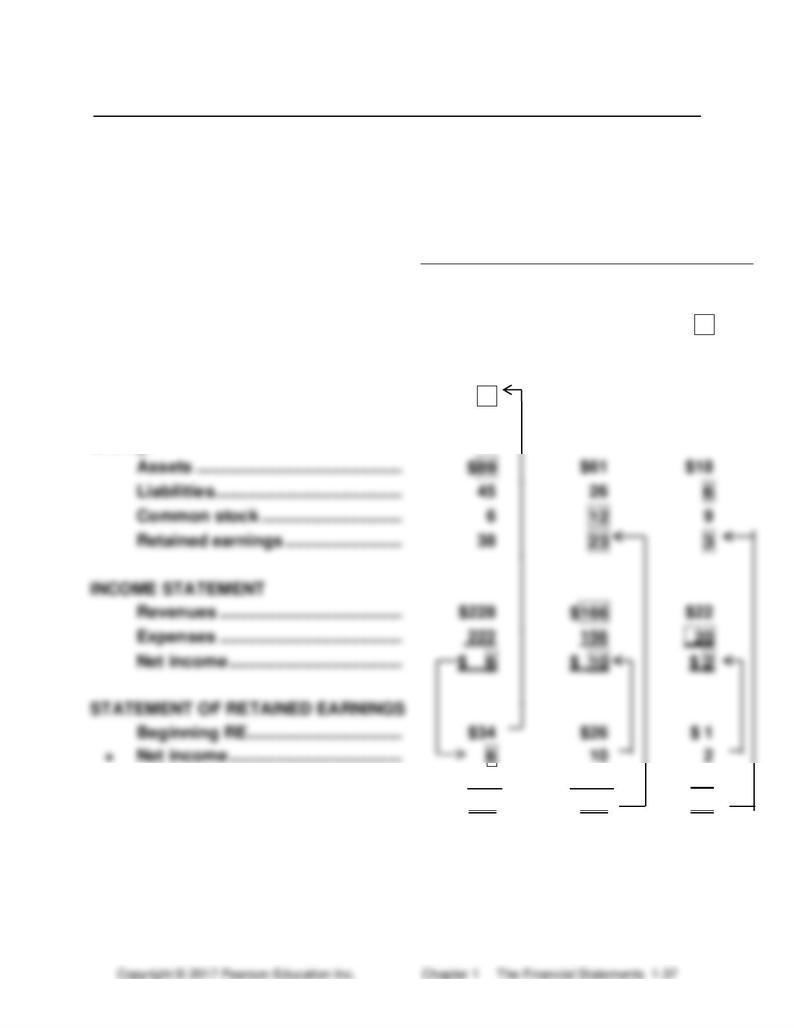
Problems
(30 min.) P 1-58A
Computed amounts in boxes.
Crystal
Co.
Lowell,
Inc.
Broom
Corp.
BALANCE SHEET
(Millions)
Beginning:
Assets ............................................
$83
$43
$15
Liabilities ........................................
43
14
7
Common stock ..............................
6
3
7
Retained earnings .........................
34
26
1
Ending:
− Dividends declared .......................
(2)
(13)
0
= Ending RE ......................................
$38
$23
$ 3
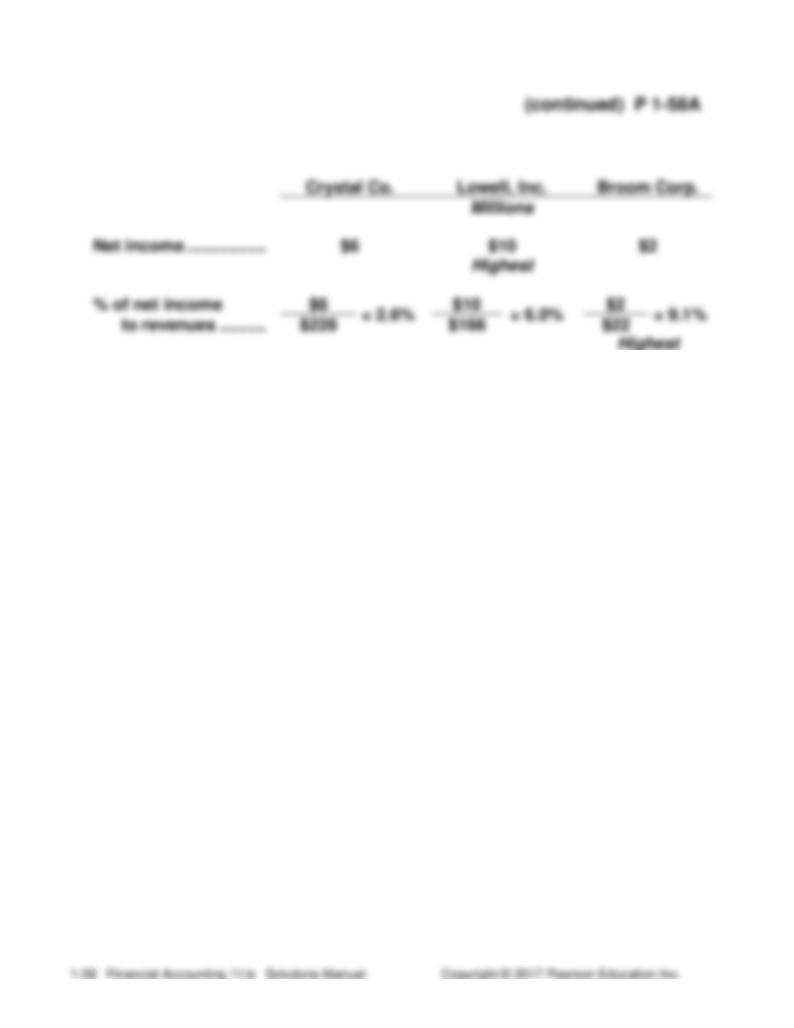
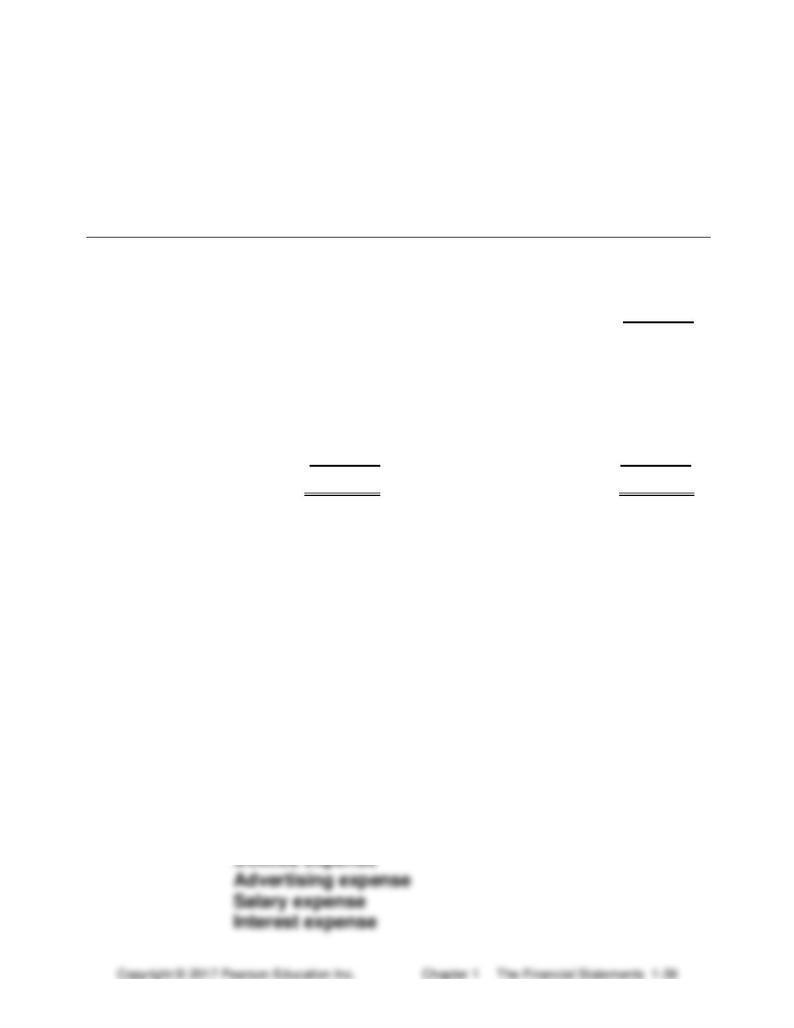
(20-25 min.) P 1-59A
Req. 1
Salem News, Inc.
Balance Sheet
October 31, 2016
ASSETS
LIABILITIES
Cash
$ 10,500
Accounts payable
$ 5,000
Accounts receivable
2,800
Note payable
55,000
Notes receivable
15,500
Total liabilities
60,000
Office supplies
1,300
STOCKHOLDERS’
Land
84,000
EQUITY
Equipment
35,000
Stockholders’ equity
89,100*
Total liabilities and
Total assets
$149,100
stockholders’ equity
$149,100
_____
*Total assets ($149,100) − Total liabilities ($60,000) = Stockholders’ equity
($89,100).
Req. 2
Salem News, Inc. is in better (not worse) financial position than the
erroneous balance sheet reports. Total assets ($149,100) are $10,100
higher than originally reported ($139,000), liabilities are $16,600 lower
than originally reported, and stockholders’ equity is $26,700 higher
than reported originally.
Req. 3
The following accounts are not reported on the balance sheet
because they are expenses. These accounts are reported on the
income statement.
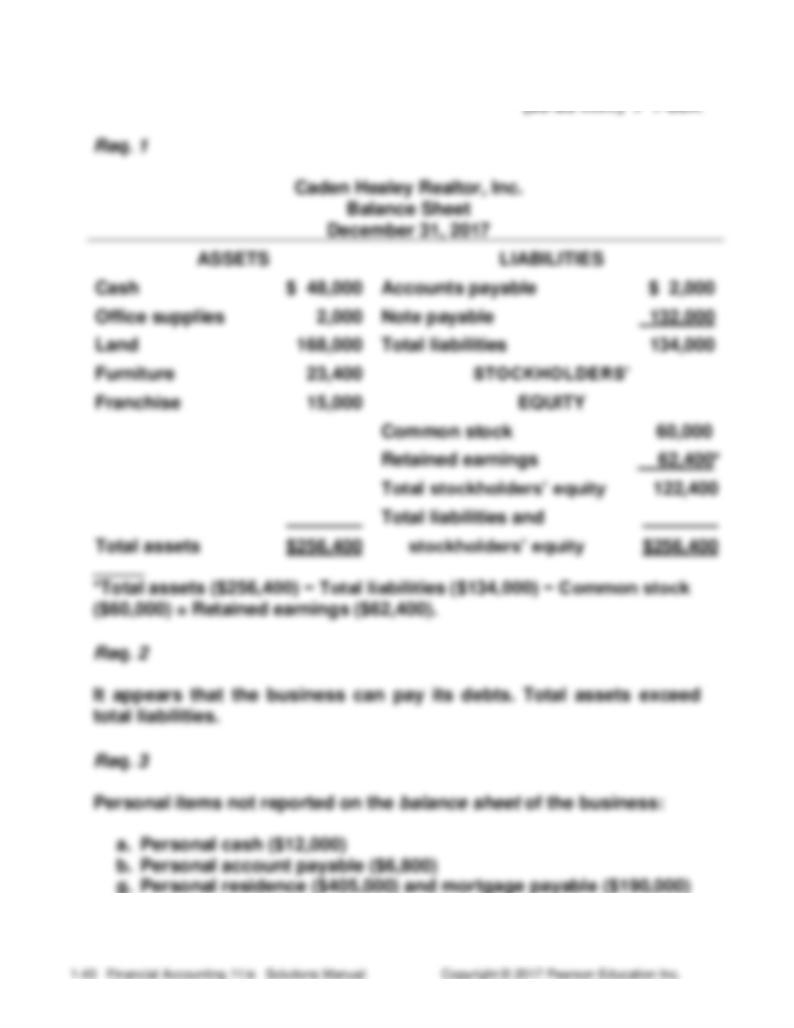
(20-25 min.) P 1-60A
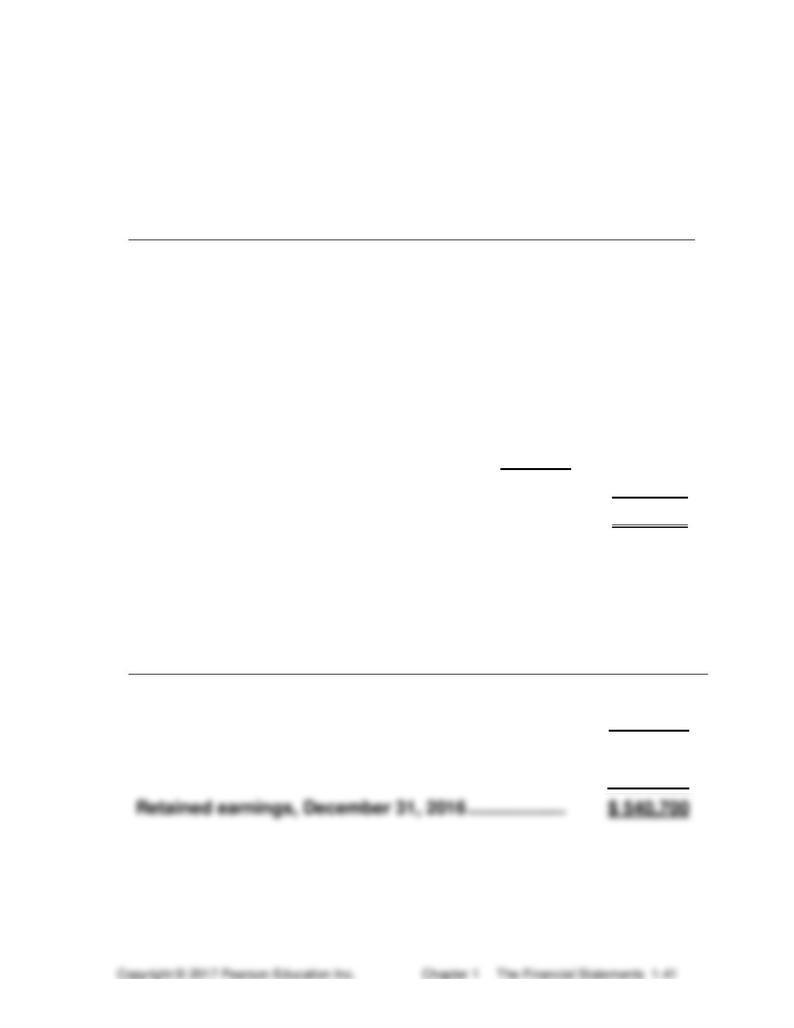
(30-45 min.) P 1-61A
Req. 1
Beckwith Garden Supply, Inc.
Income Statement
Year Ended December 31, 2016
Revenue
Service revenue .........................
$457,600
Expenses
Salary expense ..........................
$108,500
Rent expense .............................
Interest expense ........................
Utilities expense ........................
40,600
10,200
8,500
Property tax expense ................
7,300
Total expenses...........................
175,100
Net income ..........................................
$282,500
Req. 2
Beckwith Garden Supply, Inc.
Statement of Retained Earnings
Year Ended December 31, 2016
Retained earnings, December 31, 2015 ...................
$ 364,200
Add: Net income ......................................................
282,500
Subtotal
646,700
Less: Dividends declared.........................................
(106,000)
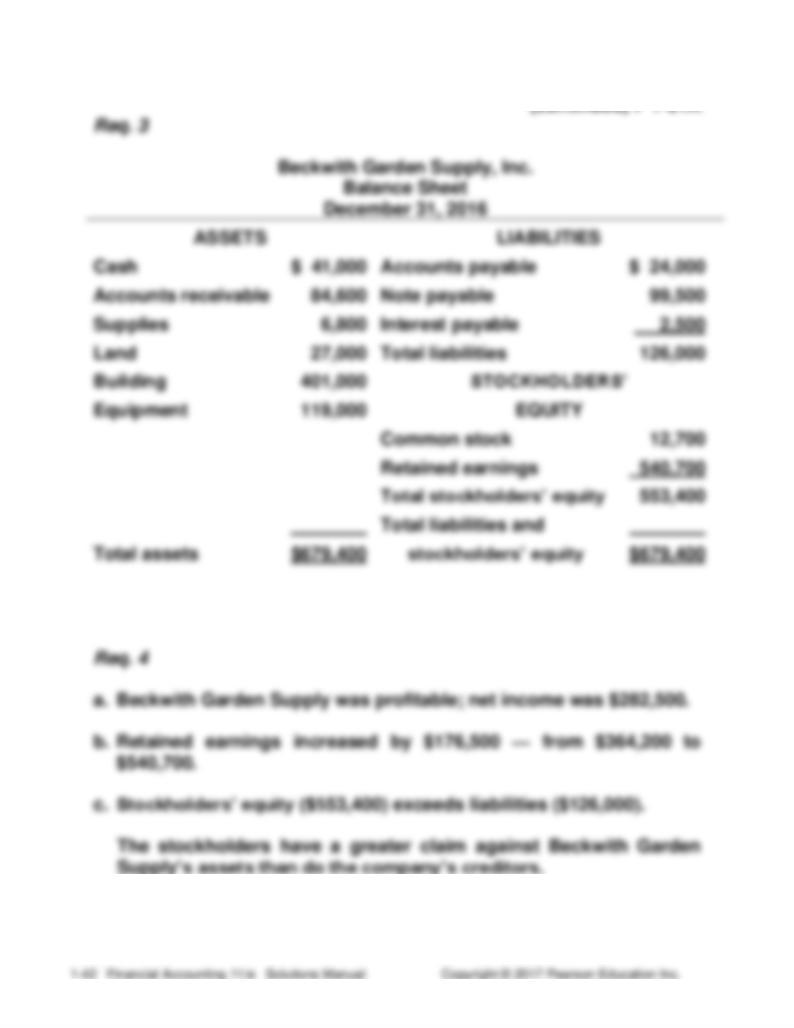
(continued) P 1-61A
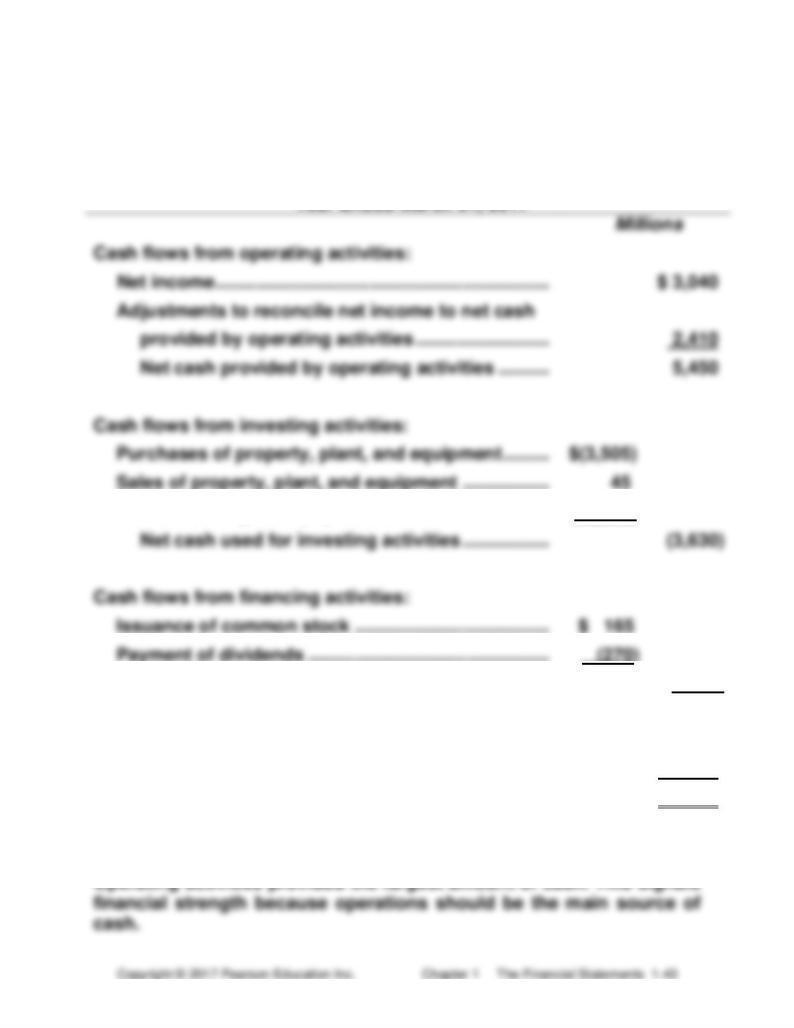
(20 min.) P 1-62A
Req. 1
Riley Company
Statement of Cash Flows
Other investing cash payments ...............................
(170)
Net cash used for financing activities .................
(105)
Net increase in cash ......................................................
$ 1,715
Cash, beginning .............................................................
210
Cash, ending ..................................................................
$ 1,925
Req. 2
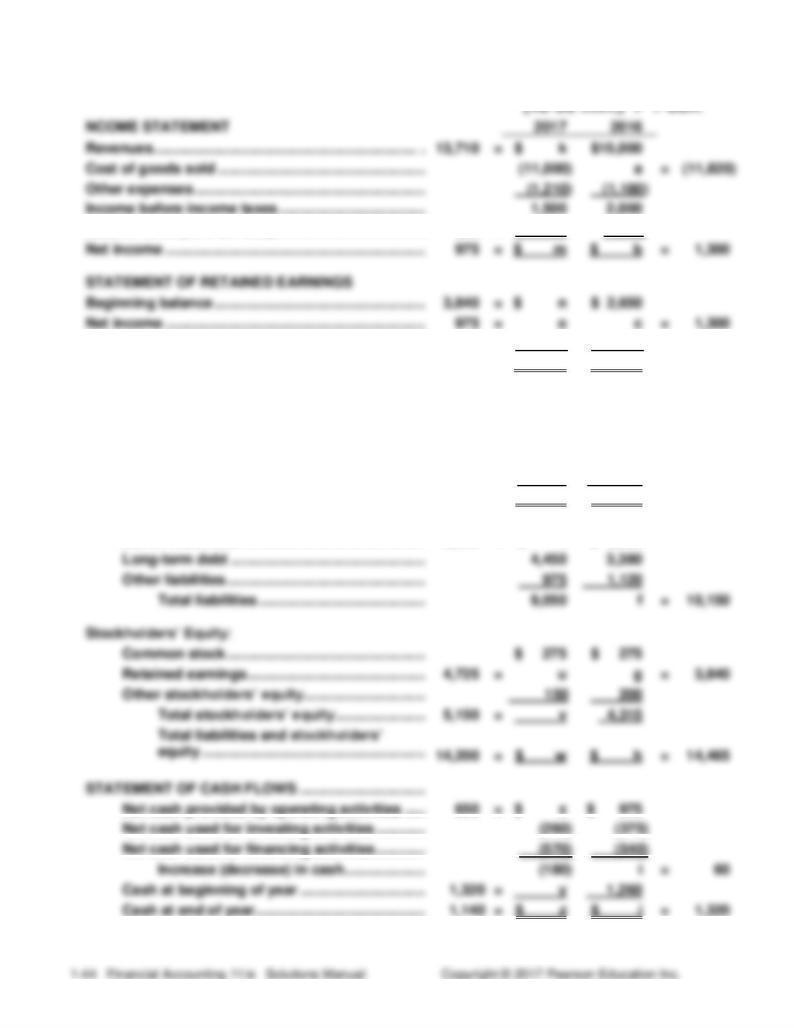
(40-50 min.) P 1-63A
Income taxes (35% tax rate) .....................................
525
=
l
(700)
Dividends declared ...................................................
(90)
(110)
Ending balance .........................................................
4,725
=
$ p
$ d
=
3,840
BALANCE SHEET
Assets:
Cash ..................................................................
1,140
=
$ q
$ e
=
1,320
Property, plant and equipment .......................
1,507
1,346
Other assets .....................................................
11,553
=
r
11,799
Total assets .............................................
14,200
=
$ s
$14,465
Liabilities:
Current liabilities .............................................
3,625
=
$ t
$ 5,650
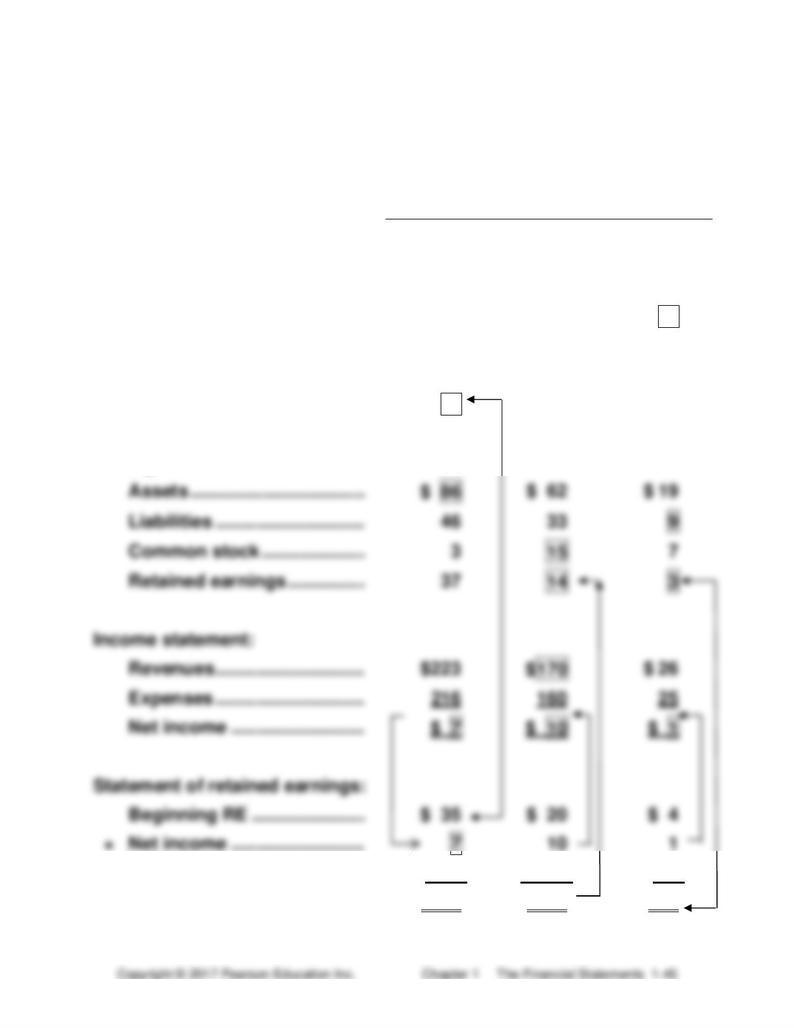
(30 min.) P 1-64B
Computed amounts in boxes
Pearl
Co.
Loomis
Co.
Bryant
Corp.
Millions
Balance sheets:
Beginning:
Assets ..................................
$ 82
$ 42
$ 17
Liabilities .............................
44
20
10
Common stock ....................
3
2
3
Retained earnings ...............
35
20
4
Ending:
− Dividends declared .............
(5)
(16)
(2)
= Ending RE ............................
$ 37
$ 14
$ 3
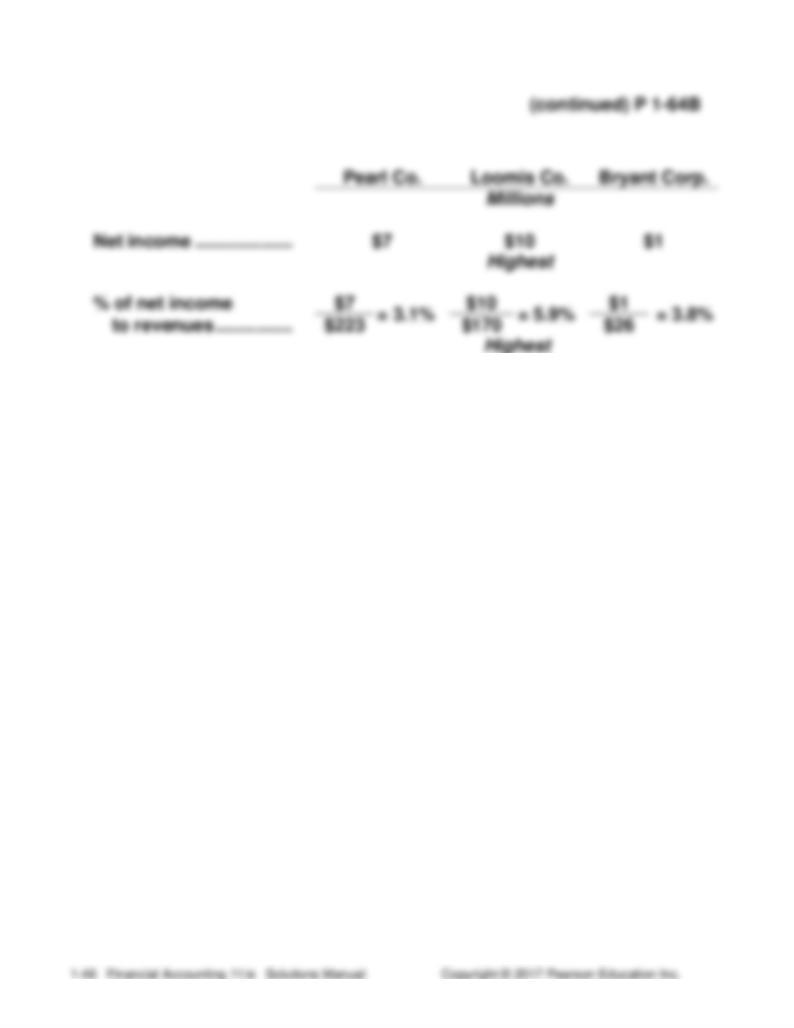
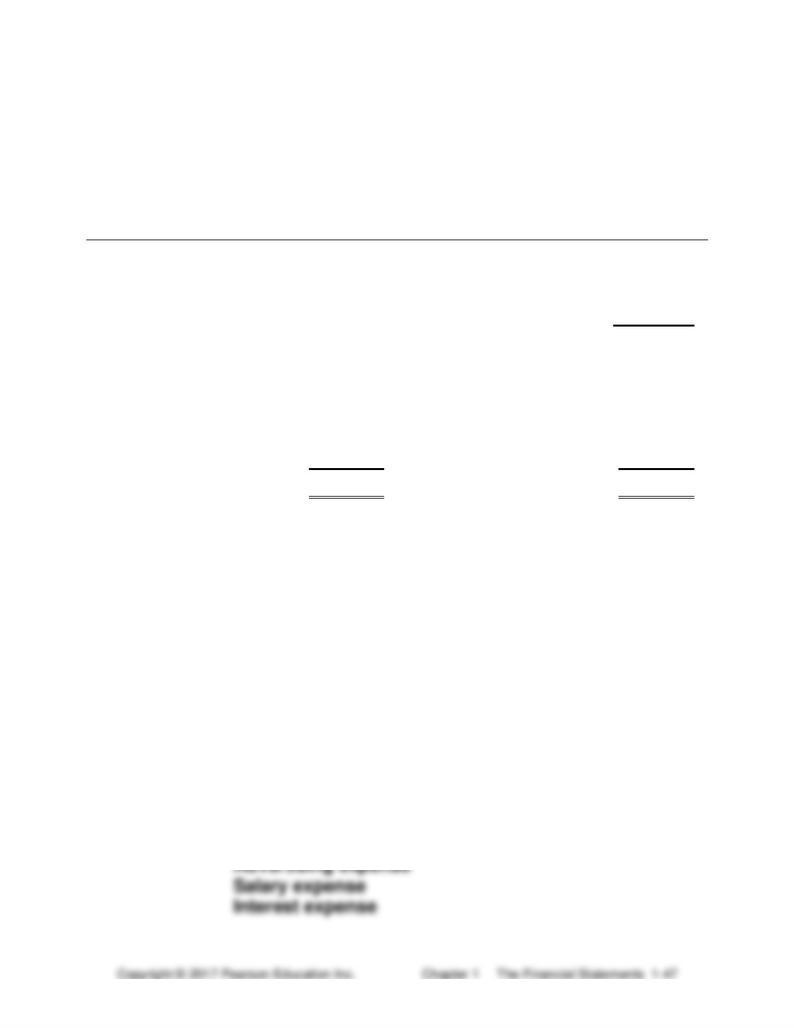
(20-25 min.) P 1-65B
Req. 1
Candace Design, Inc.
Balance Sheet
June 30, 2016
ASSETS
LIABILITIES
Cash
$ 8,500
Accounts payable
$ 2,500
Accounts receivable
3,800
Note payable
54,500
Notes receivable
13,000
Total liabilities
57,000
Office supplies
1,000
STOCKHOLDERS’
Land
76,000
EQUITY
Equipment
35,600
Stockholders’ equity
80,900*
Total liabilities and
Total assets
$137,900
stockholders’ equity
$137,900
_____
*Total assets ($137,900) − Total liabilities ($57,000) = Stockholders’
equity ($80,900).
Req. 2
Candace Design, Inc. is in a better financial position than the
erroneous balance sheet reports. Assets are $10,700 greater and
liabilities are $17,500 less than originally reported, and equity is
$28,200 greater than reported originally.
Req. 3
The following accounts are not reported on the balance sheet
because they are expenses. Expenses are reported on the income
statement.
Utilities expense
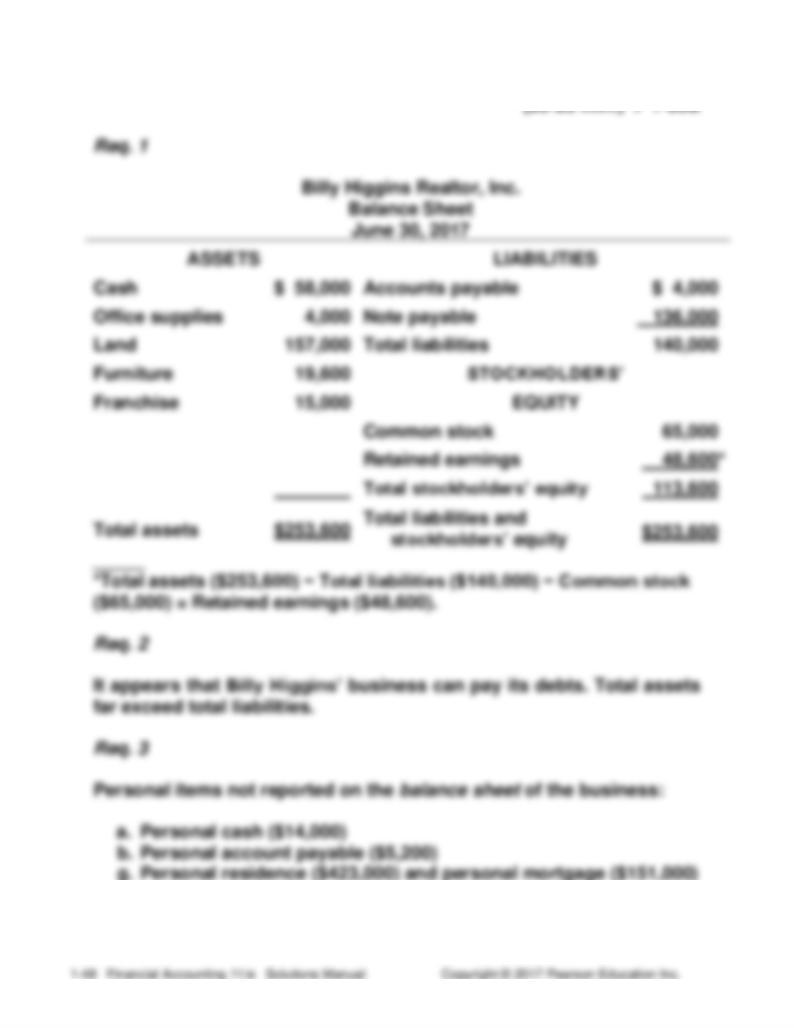
(20-25 min.) P 1-66B
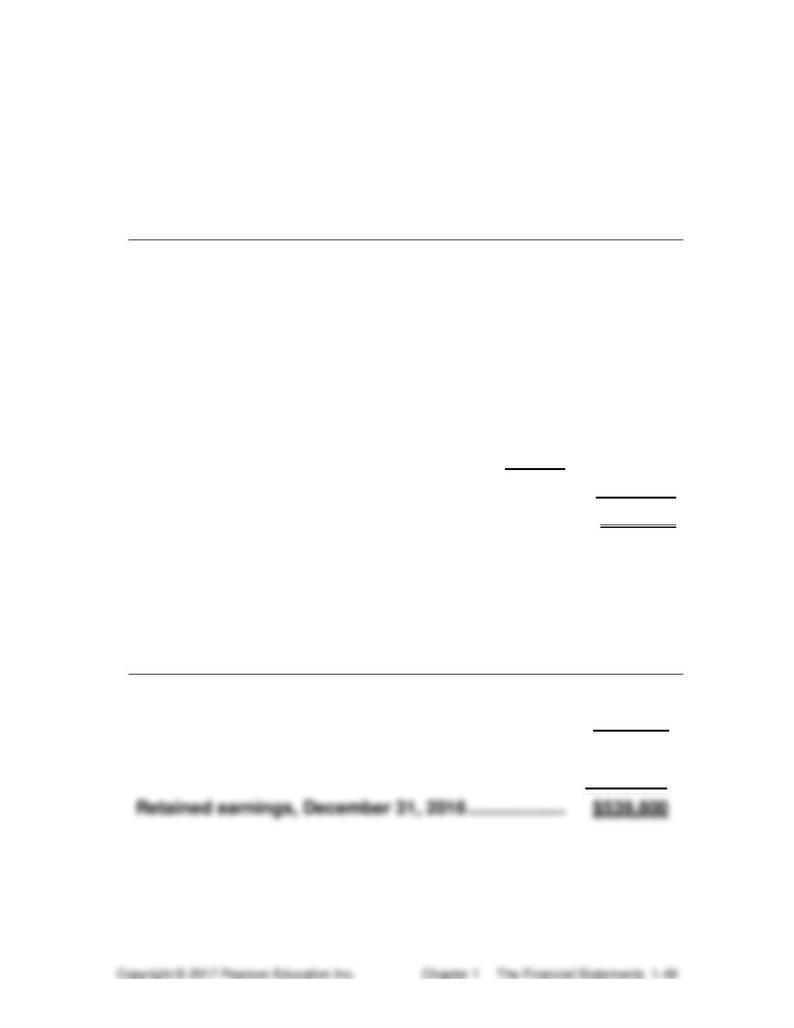
(30-45 min.) P 1-67B
Req. 1
Blue Moon Products, Inc.
Income Statement
Year Ended December 31, 2016
Revenue:
Service revenue ........................
$458,600
Expenses:
Salary expense .........................
$108,300
Rent expense ............................
40,200
Utilities expense .......................
8,100
Interest expense .......................
10,800
Property tax expense ...............
7,900
Total expenses ..........................
175,300
Net income ..........................................
$283,300
Req. 2
Blue Moon Products, Inc.
Statement of Retained Earnings
Year Ended December 31, 2016
Retained earnings, December 31, 2015 ...................
$364,500
Add: Net income ......................................................
283,300
Subtotal
647,800
Less: Dividends declared.........................................
(108,000)
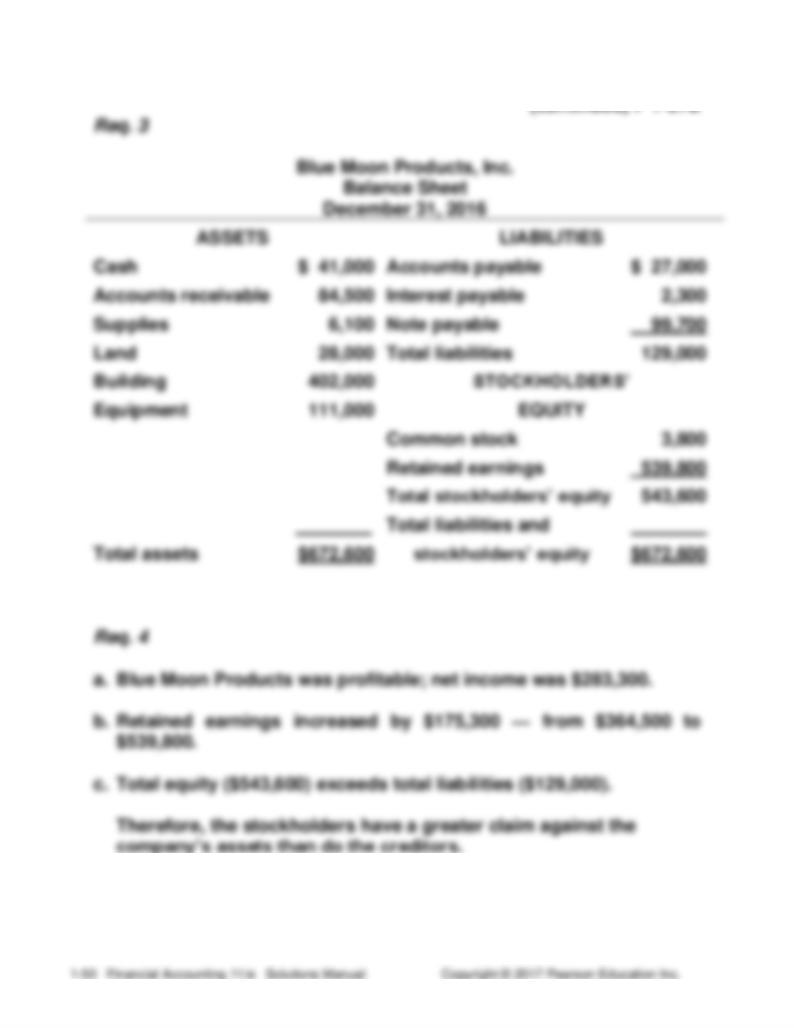
(continued) P 1-67B
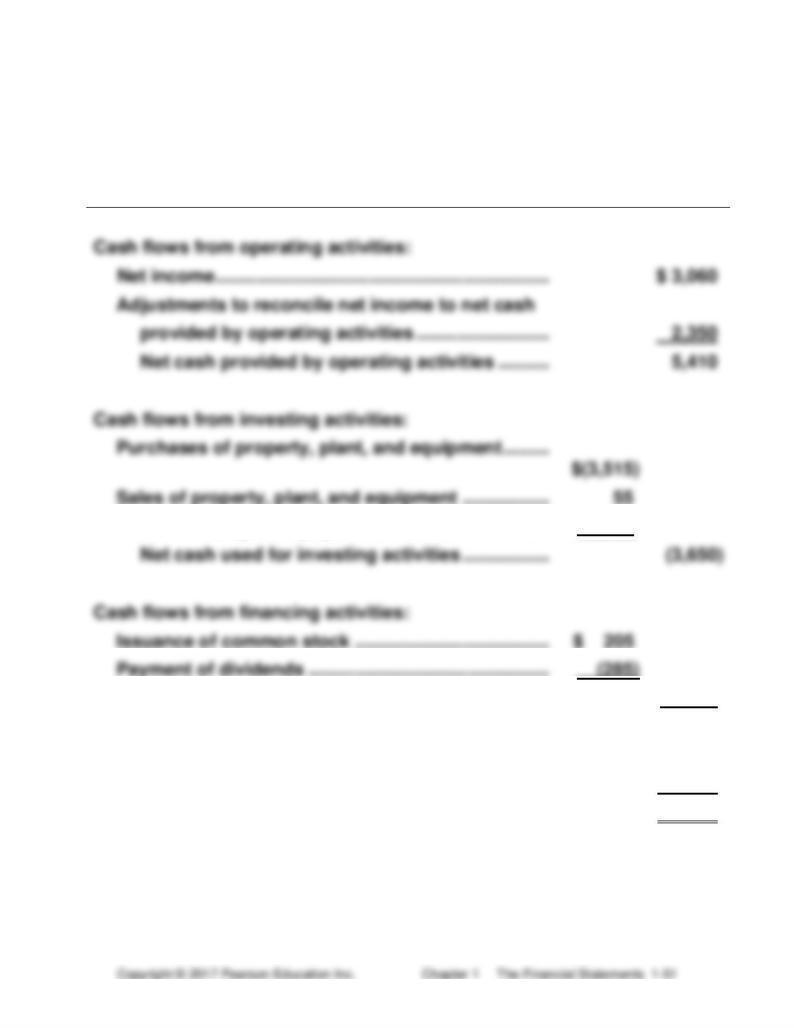
(20 min.) P 1-68B
Req. 1
Salem Water Company
Statement of Cash Flows
Year Ended March 31, 2017
Millions
Other investing cash payments ...............................
(190)
Net cash used for financing activities .................
(80)
Net increase in cash ......................................................
$1,680
Cash, beginning .............................................................
230
Cash, ending ..................................................................
$ 1,910
Req. 2
Operating activities provided the bulk of Salem Water Company's
cash. This is a sign of strength because operations should be the
main source of cash.
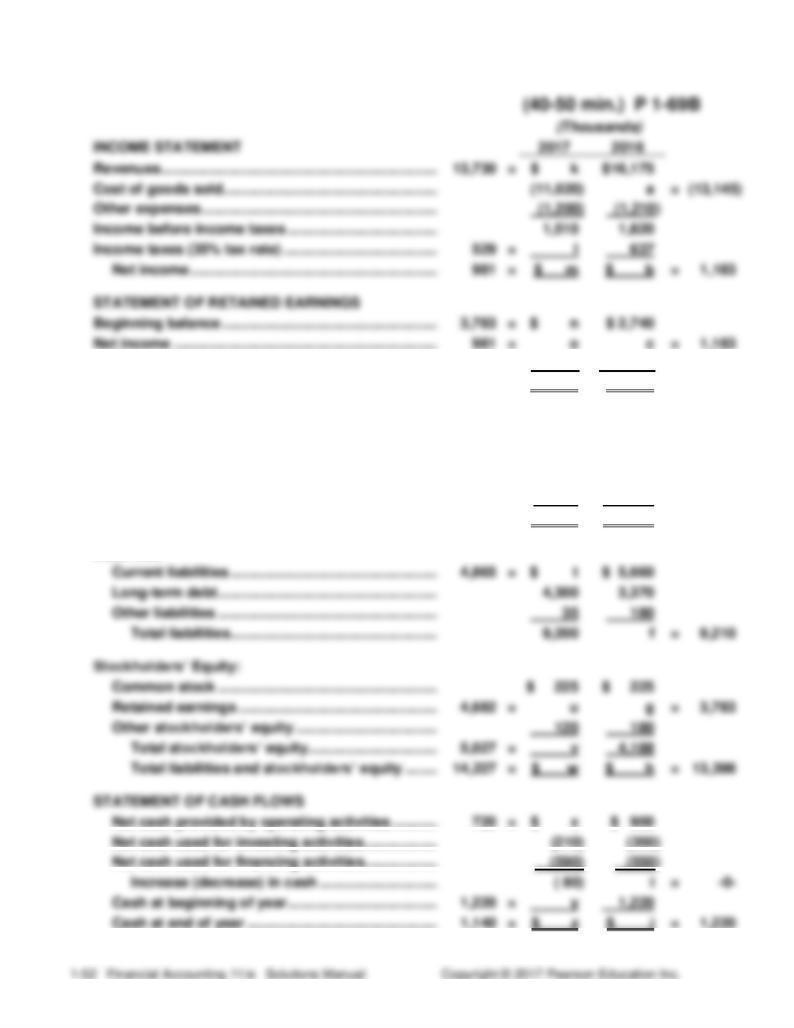
Dividends declared ....................................................
(82)
(140)
Ending balance ..........................................................
4,682
=
$ p
$ d
=
3,783
BALANCE SHEET
Assets:
Cash .......................................................................
1,140
=
$ q
$ e
=
1,220
Property, plant and equipment .............................
1,567
1,306
Other assets ..........................................................
11,520
=
r
10,872
Total assets .......................................................
14,227
=
$ s
$13,398
Liabilities:
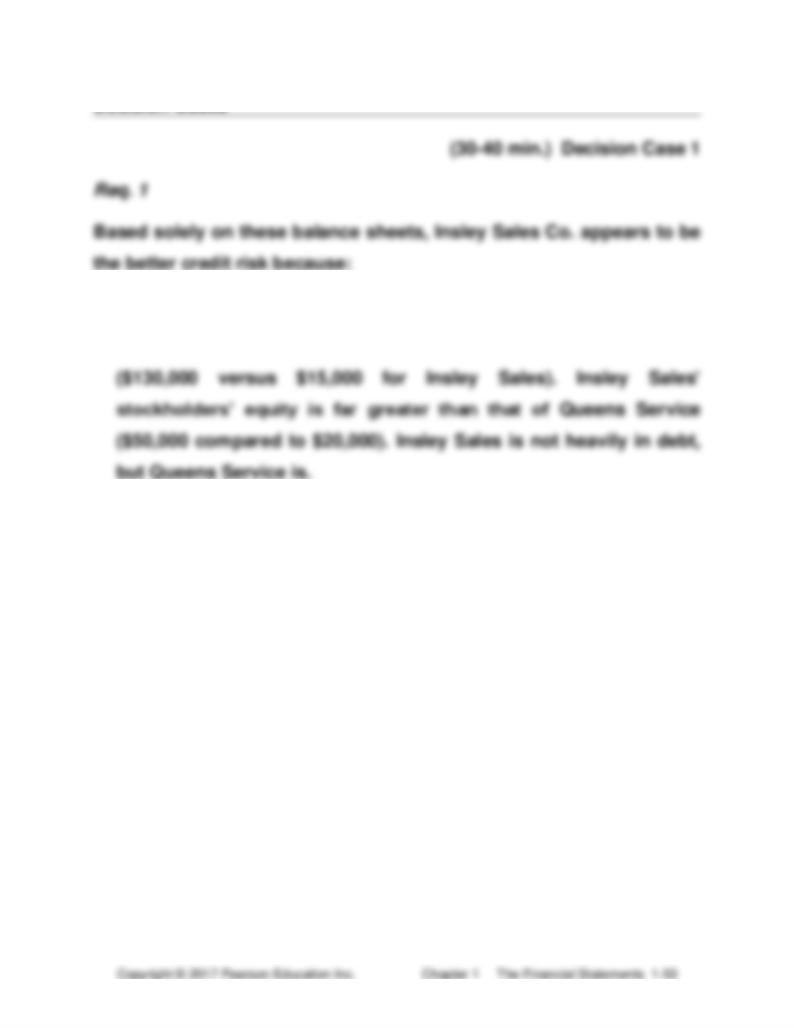
Decision Cases
1. Queens Service has more assets ($150,000) than Insley Sales
($65,000), but Queens Service owes much more in liabilities
2. You would be better off granting the loan to Insley Sales. You
should consider what will happen if the borrower cannot pay you
back as planned. Queens Service has far more liabilities to pay,
and it may be hard for Queens Service to come up with the money
to pay you. On the other hand, Insley Sales has little debt to pay to
others before paying you.
Student responses may vary.
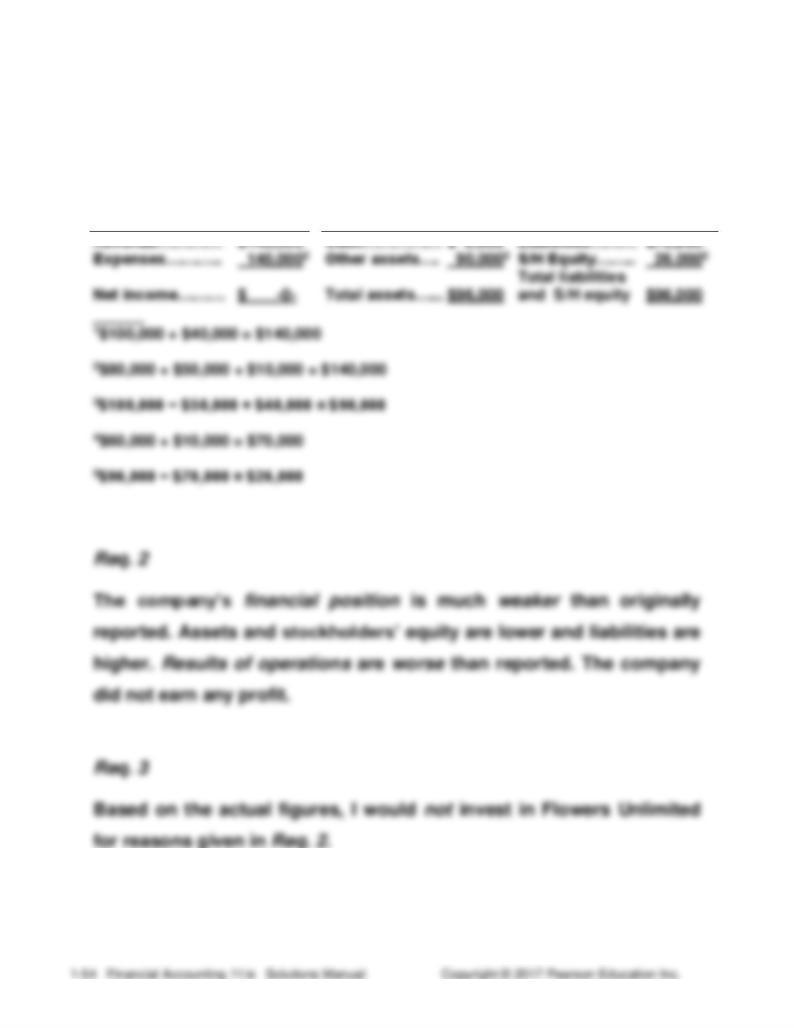
(20-30 min.) Decision Case 2
Req. 1
Flowers Unlimited, Inc.
Flowers Unlimited, Inc.
Income Statement
Balance Sheet
Year Ended Dec. 31, 2016
Dec. 31, 2016
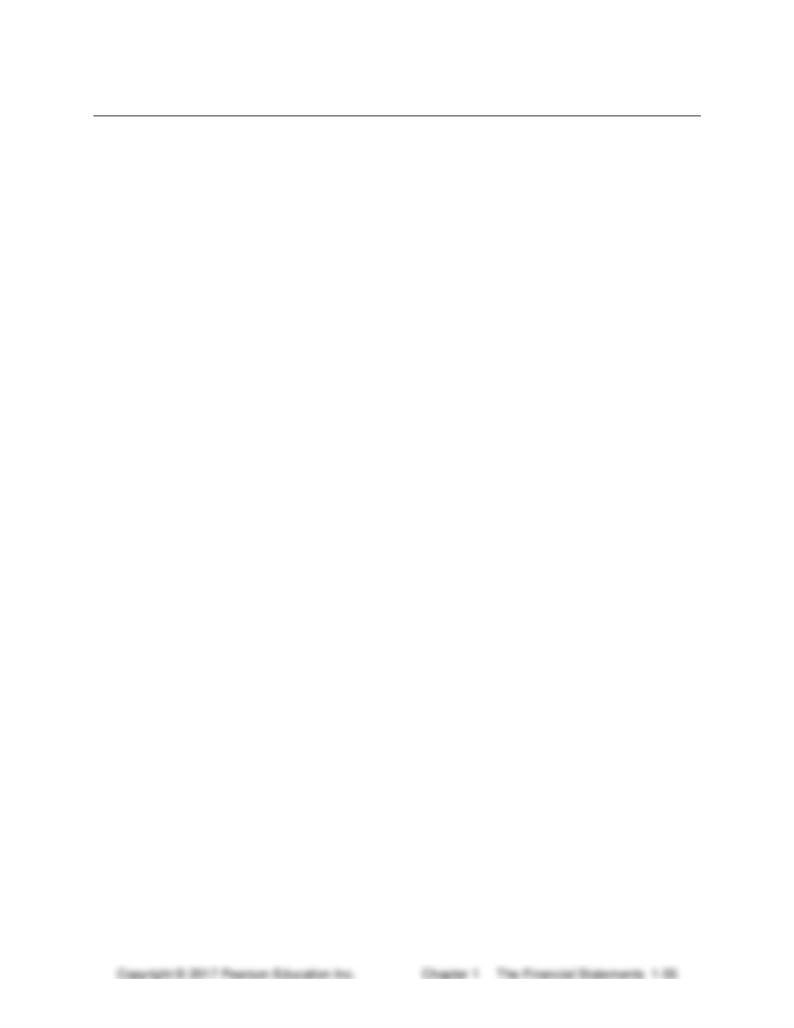
Ethical Issue
Note to instructor: student responses will vary on this problem.
Keep the discussion pointed toward use of the multiple-criteria model
for making good ethical decisions, pointing out elements of students’
reasoning that may be faulty or incomplete. It might be useful to have
a debate or role play, assigning students to different sides of the
issue (for or against accepting a copy of the exam).
Req. 1
The fundamental ethical issue in this situation is whether you should
accept a copy of the old exam from your friend.
Req. 2
The stakeholders are:
a. You
b. Your friend
c. The remainder of the students in the class
d. The professor
e. The University
f. Your family
(This may not be a complete list; you may think of more.)
Consequences are discussed in requirement 3.
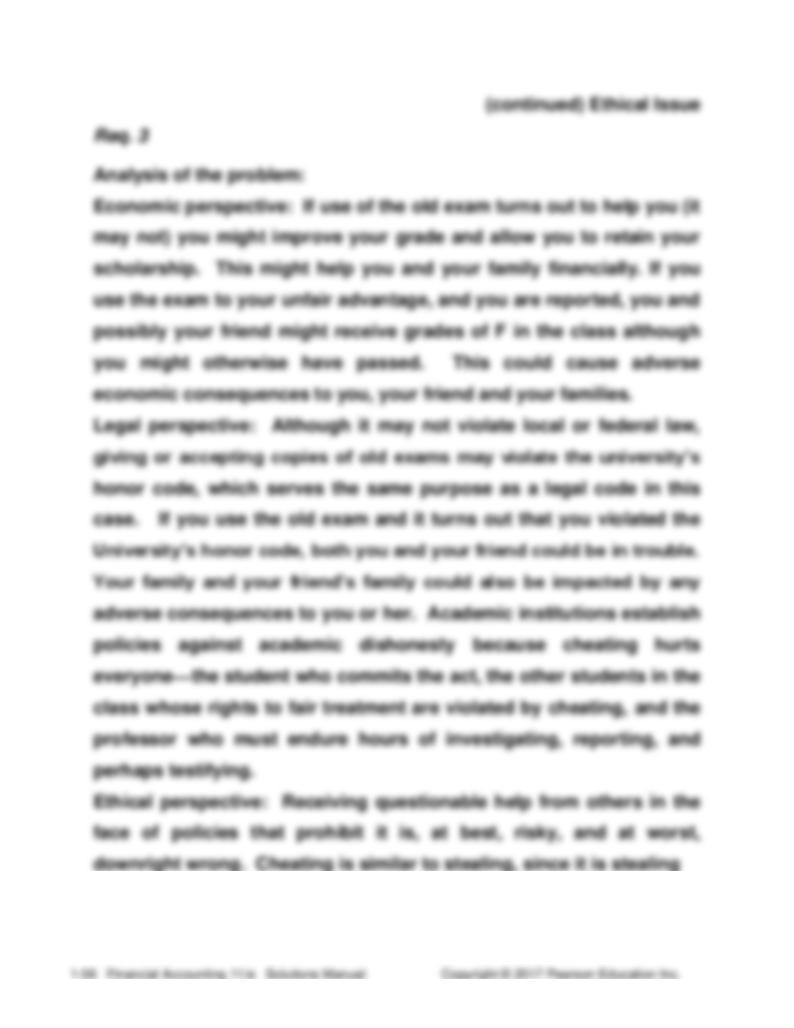
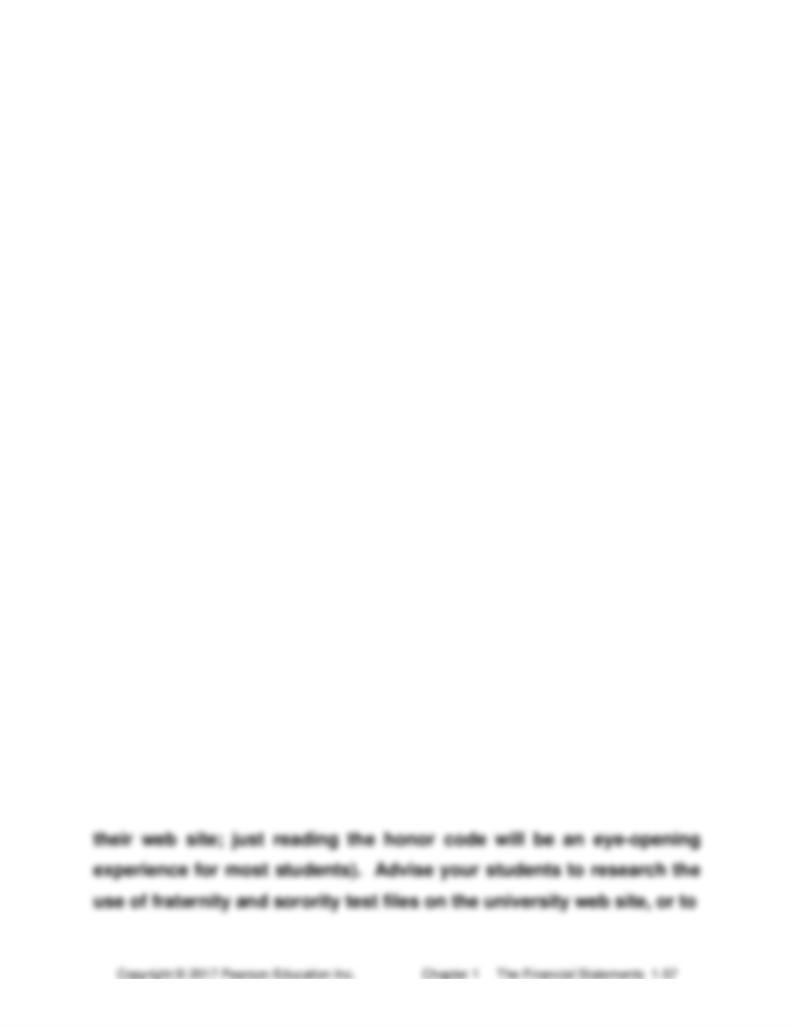
(continued) Ethical Issue
the work of another without their permission. It is usually
accompanied by lying to cover it up, or at least, not revealing the
truth. Cheating violates other students’ rights to fair and equal
treatment. It violates the instructor’s rights to run a course as a “fair
game” for all participants. Because the students and faculty are hurt
by cheating, the university is hurt too. If cheating goes unpunished,
grades are inflated, ultimately damaging the academic reputation of
the institution and eroding the value of its degrees. Parents of
students who are caught cheating have to endure the agony of
working through the problem with their son or daughter, and perhaps
the social stigma that comes from adverse publicity.
These are just some of the arguments against cheating. Of course,
there is a question in this case as to whether taking the test actually
violates the professor’s or the university’s policies.
Req. 4
It would be helpful to find out what the professor’s policies are with
respect to the use of fraternity and sorority test files. The university
might have a blanket policy on this. (Some students might spend a
little time researching this by reading the university’s honor code on
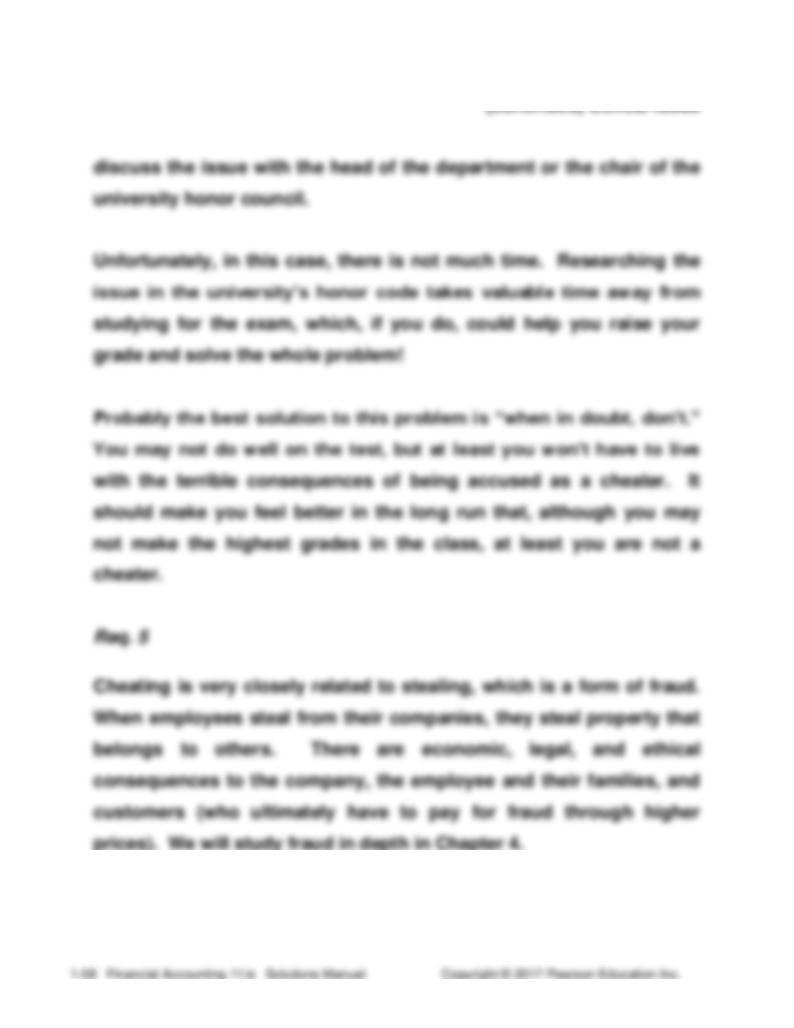
(continued) Ethical Issue
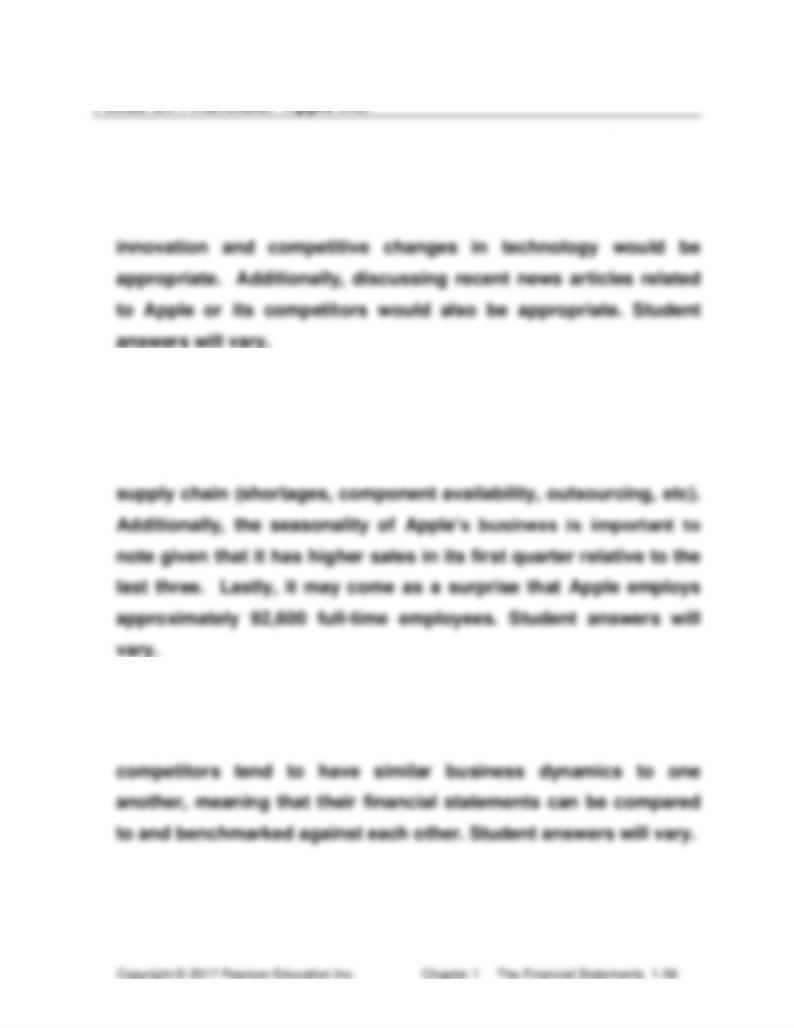
Focus on Financials: Apple Inc.
1. Students can emphasize a variety of points regarding Apple Inc.,
and its industry. For example, a discussion on the product
2. Some important information in this portion of the financials is the
description of their distribution channels (third-party resellers),
competitors (product innovation, market opportunities, etc.), and
3. Samsung, Google, Sony, or HP are some of Apple Inc.’s
competitors. It is important to identify competitors because
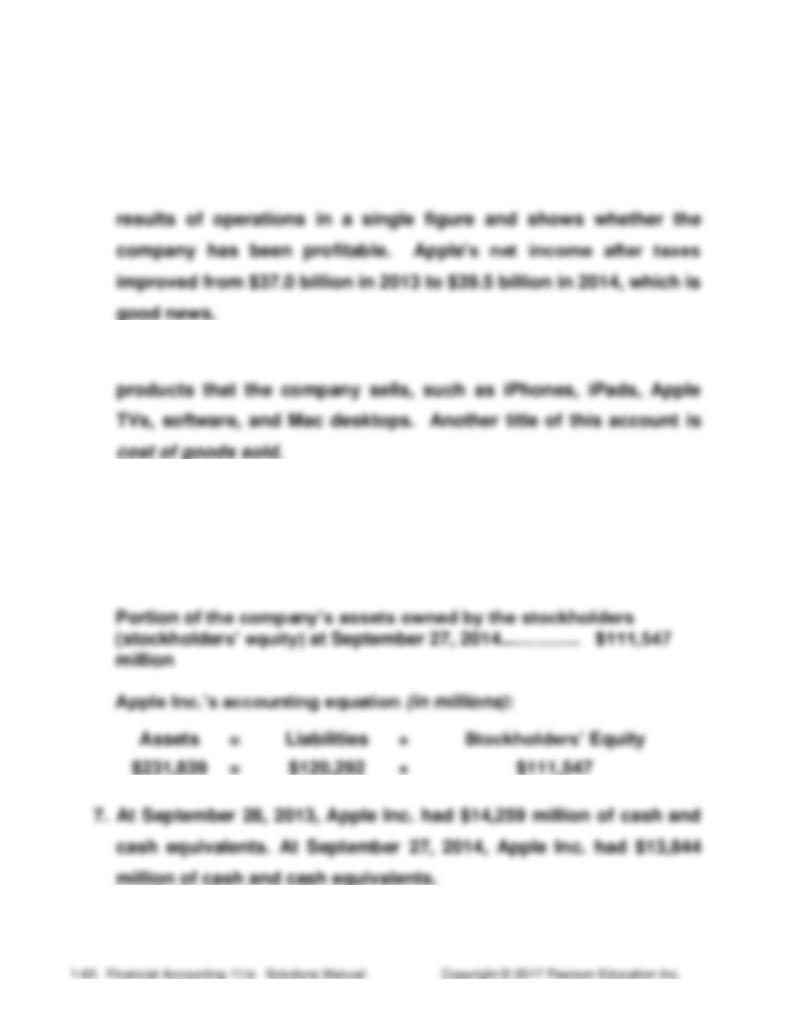
(continued) Apple Inc.
4. Net income, because it shows the overall result of all the revenues
minus all the expenses for a period. In effect, net income gives the
5. Apple Inc.’s largest expense is cost of sales. This is the cost of the
6. Total resources (total assets) at September 27, 2014.….$231,839
million
Amount owed (total liabilities) at September 27, 2014….$120,292
million
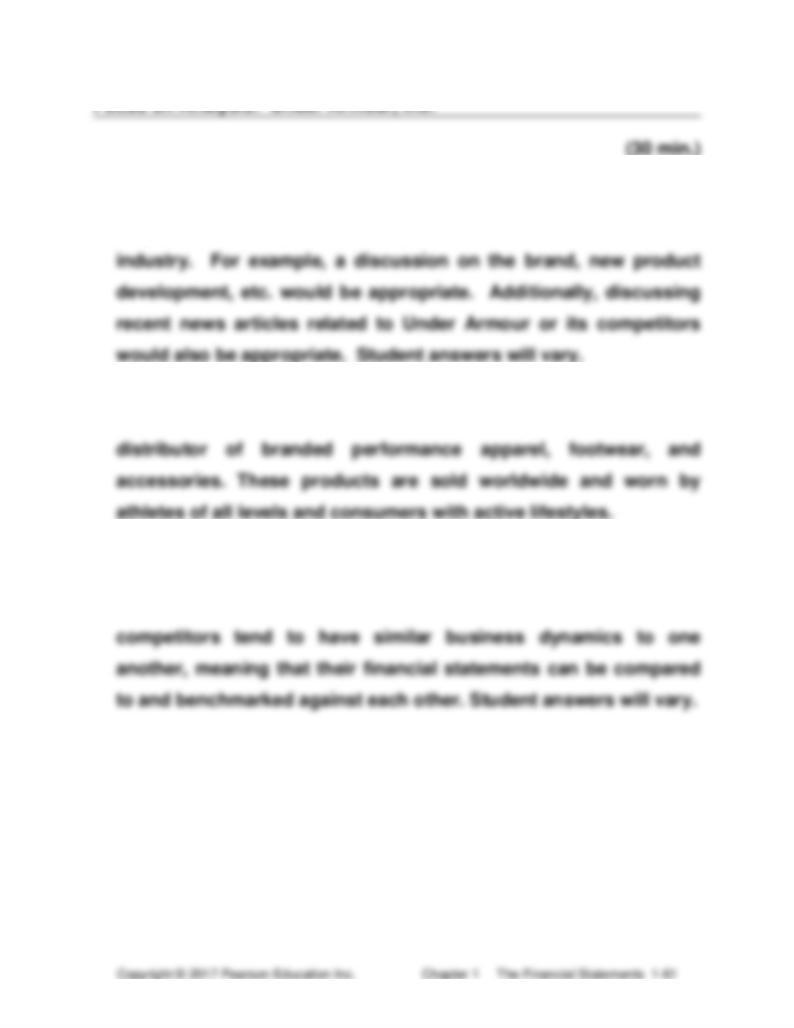
Focus on Analysis: Under Armour, Inc.
1. Under Armour, Inc. is an athletic apparel company. Students can
emphasize a variety of points regarding Under Armour, Inc. and its
2. Note 1 states Under Armour is a developer, marketer and
3. Nike, Adidas, and Columbia Sportswear are some of Under Armour,
Inc.’s competitors. It is important to identify competitors because

(continued) Under Armour, Inc.
4. Under Armour, Inc.’s Accounting Equation (in millions):
Assets
=
Liabilities
+
Shareholders’ Equity
5. The result of operations for 2014 was a net income of $208,042
thousand. This is good news for Under Armour, Inc. Revenue
6. According to Under Armour, Inc.’s Consolidated Statements of
7. The Consolidated Balance Sheets report cash and cash
equivalents as part of the company’s financial position. The
